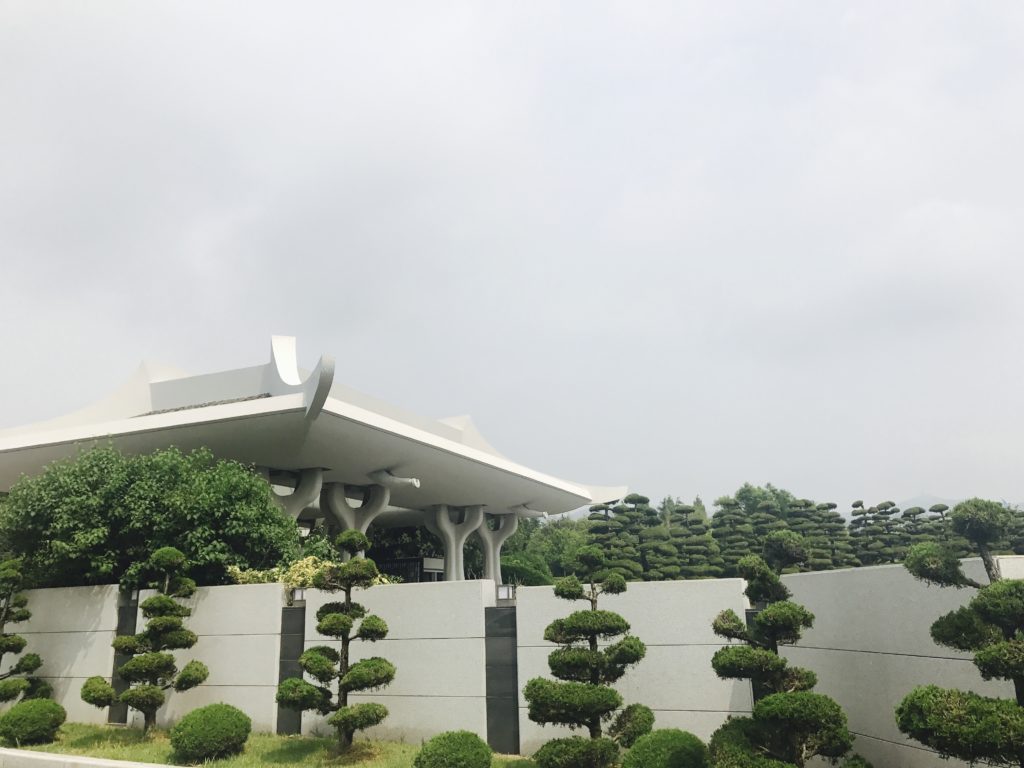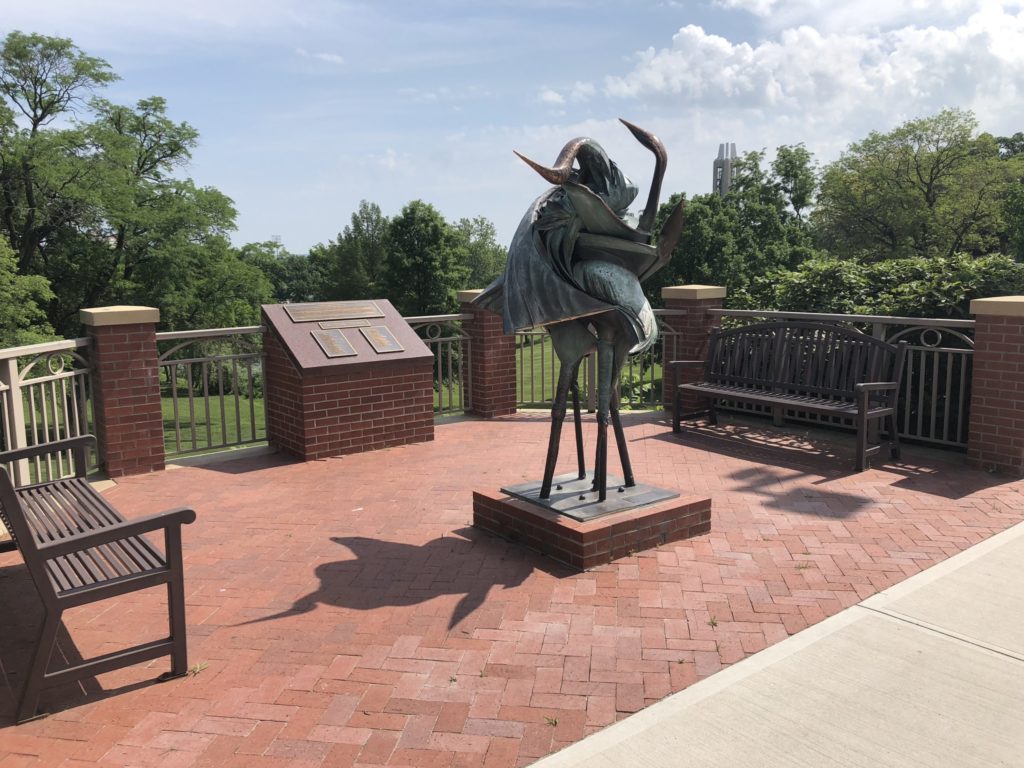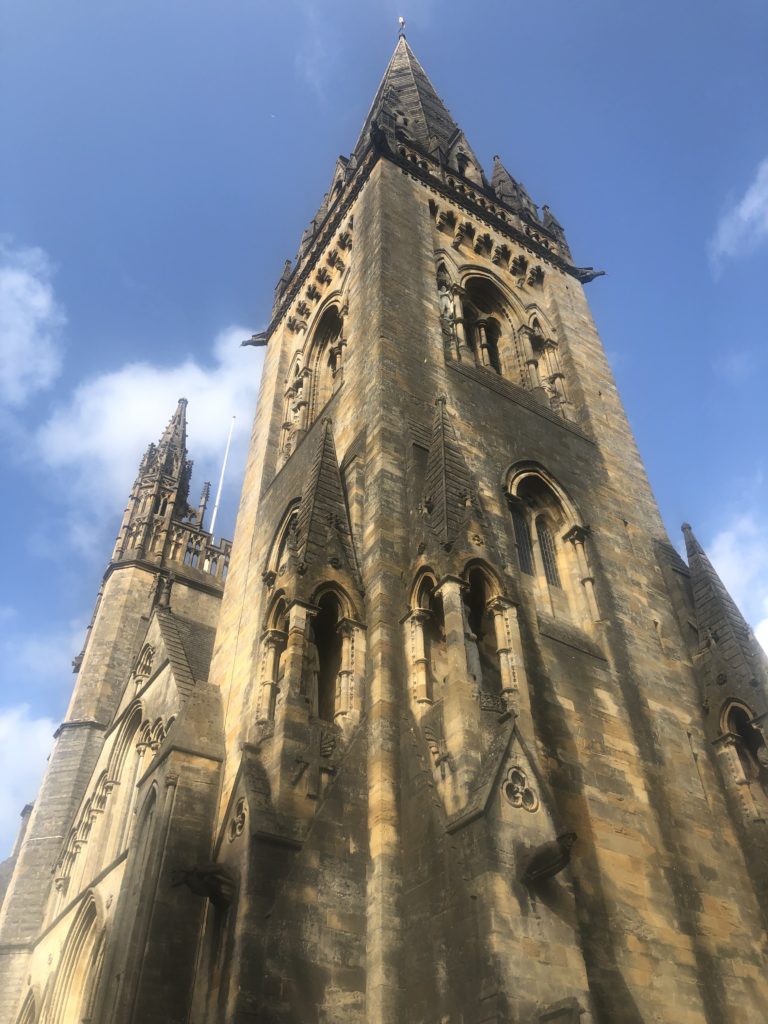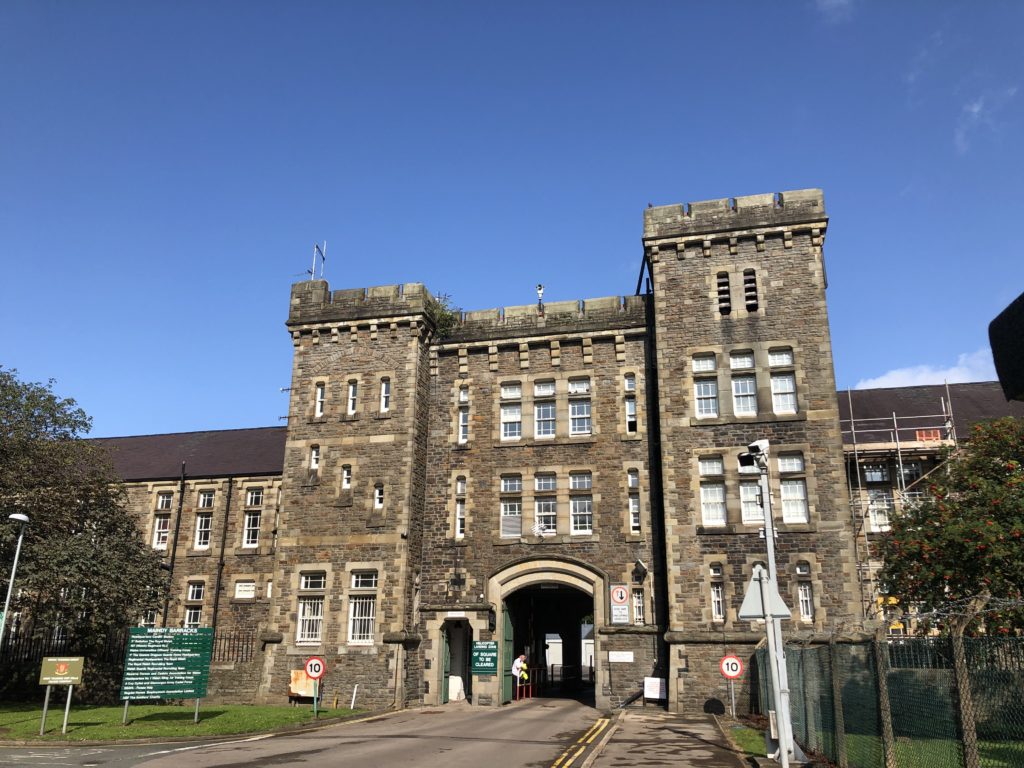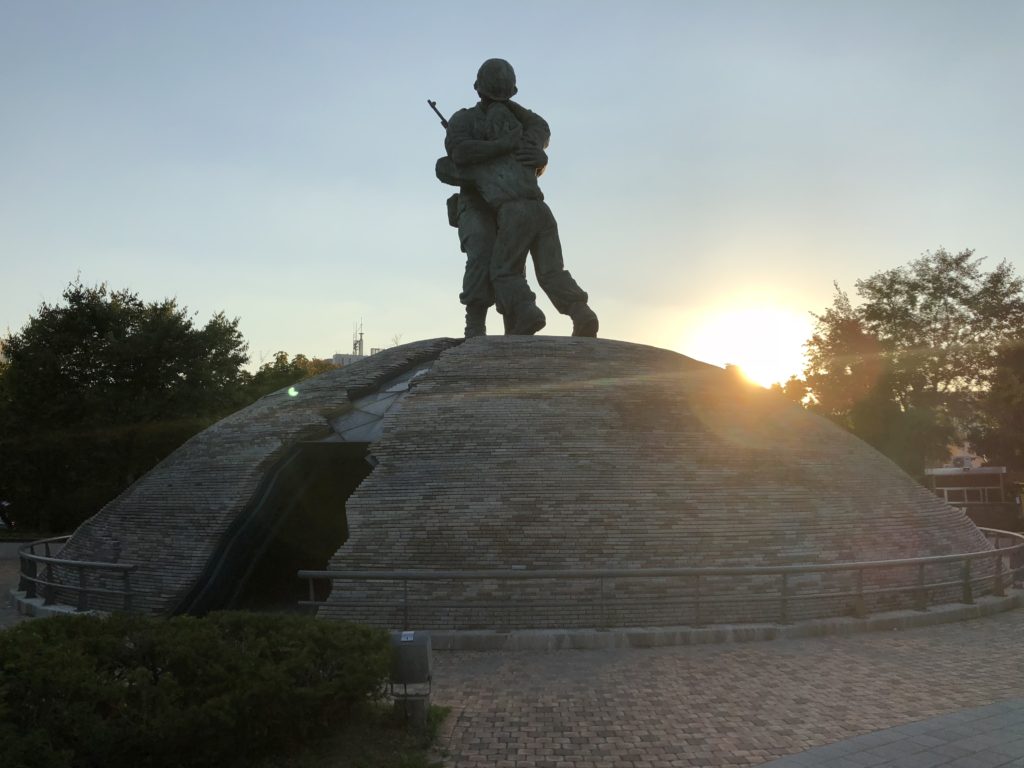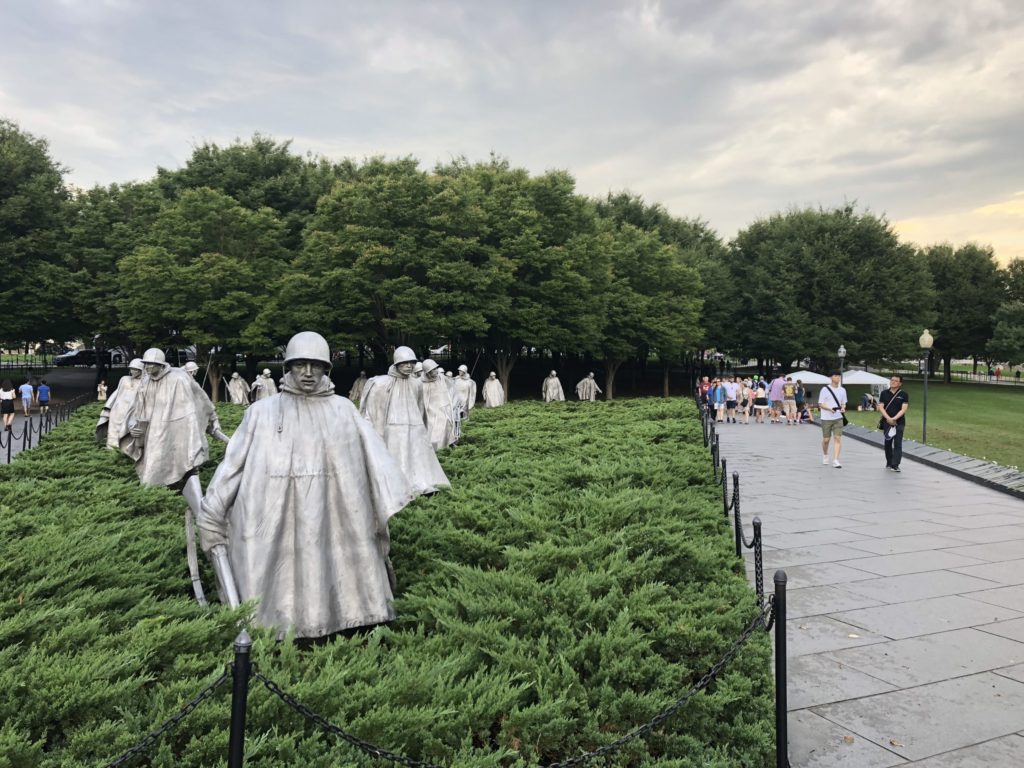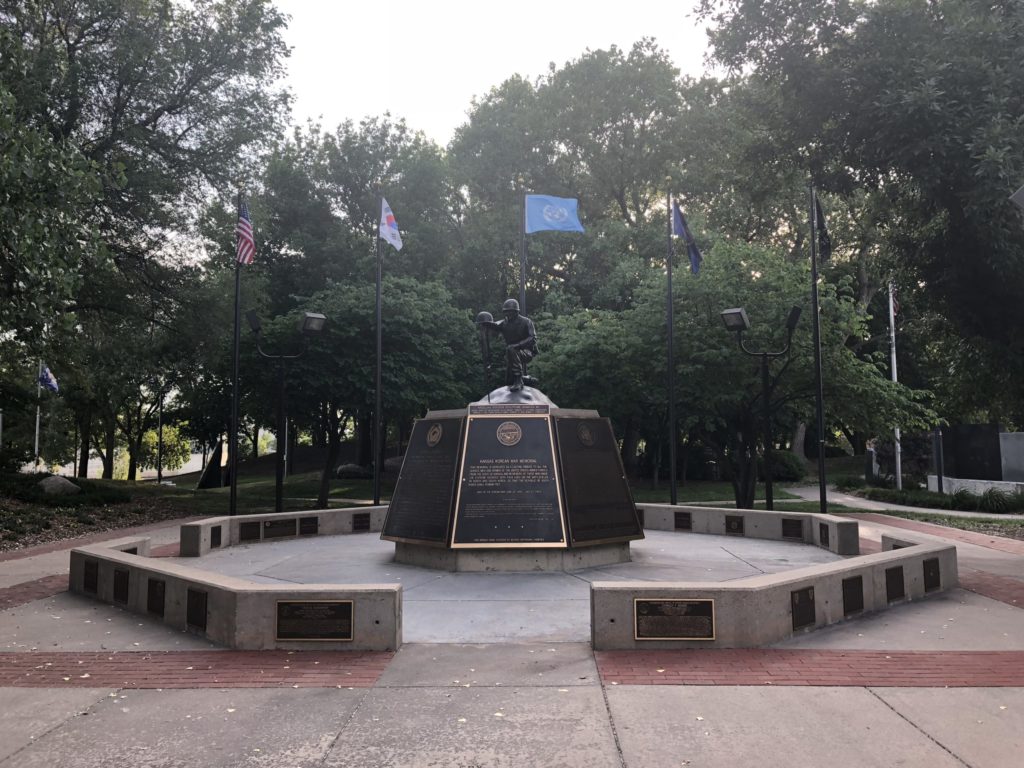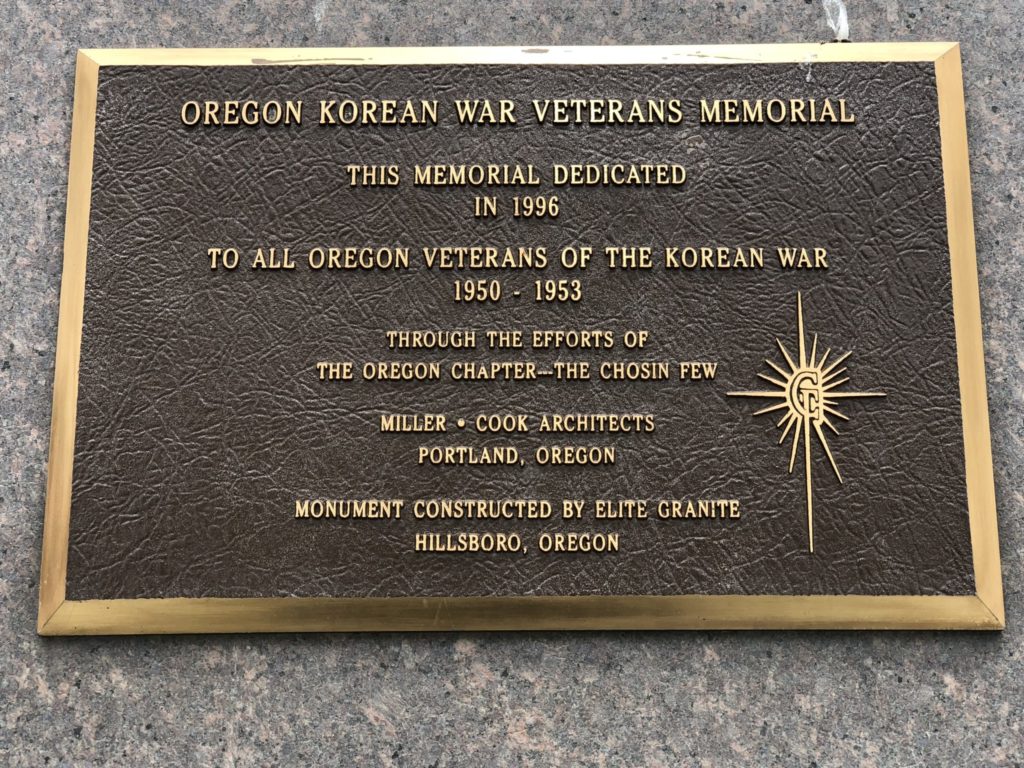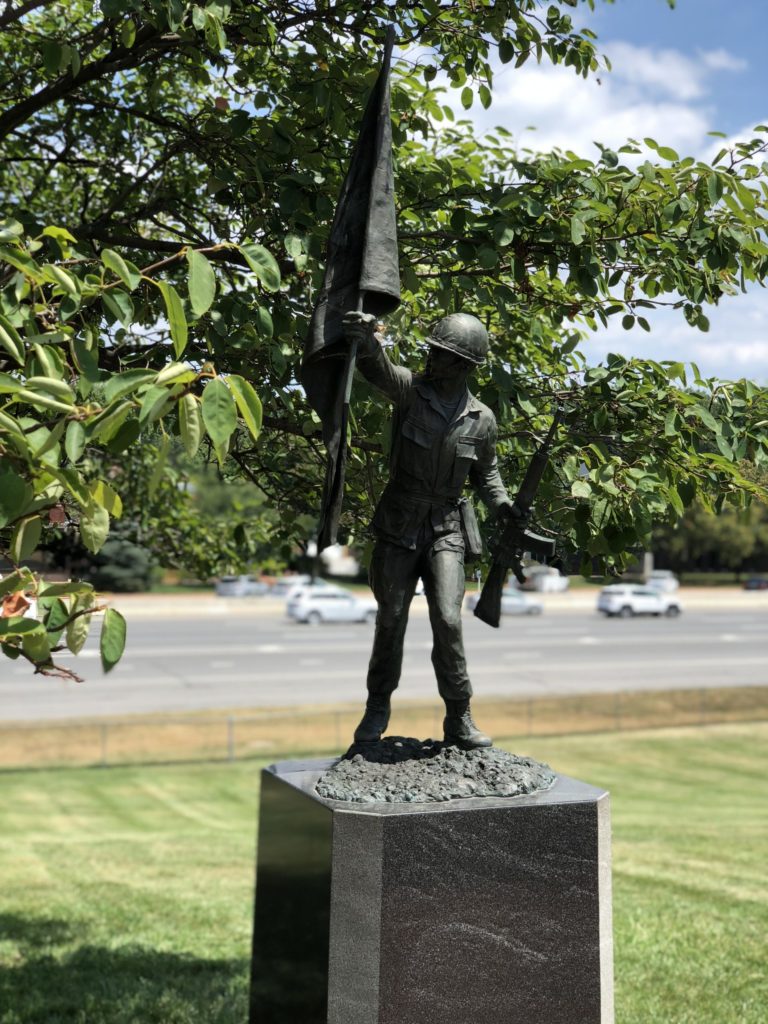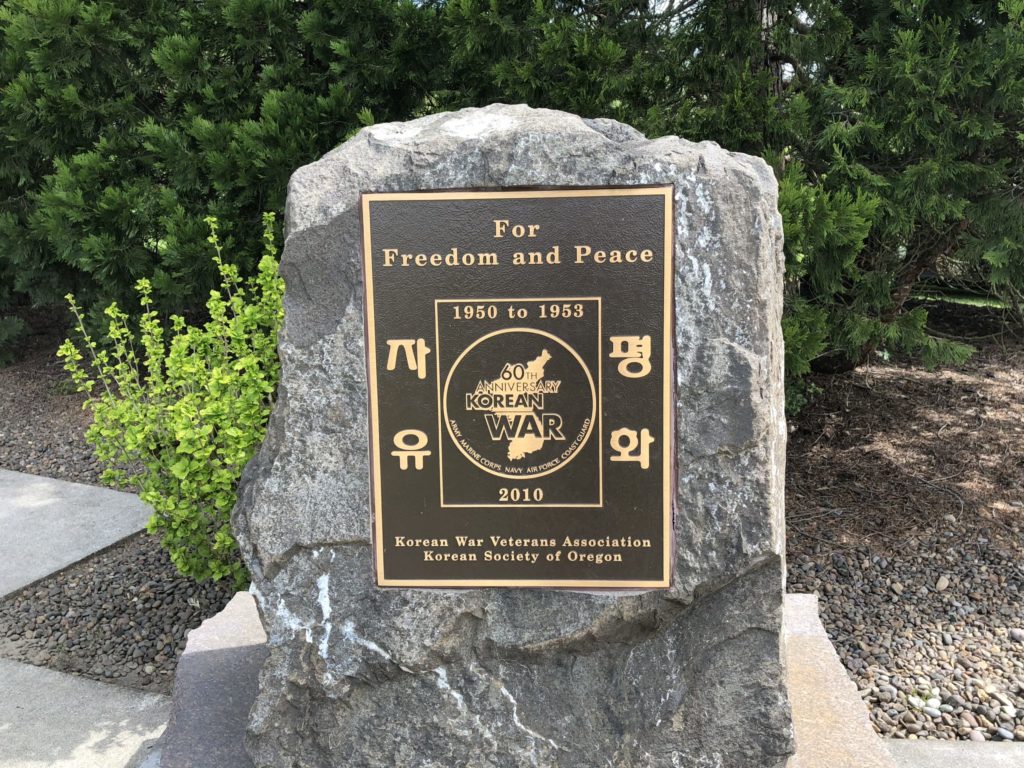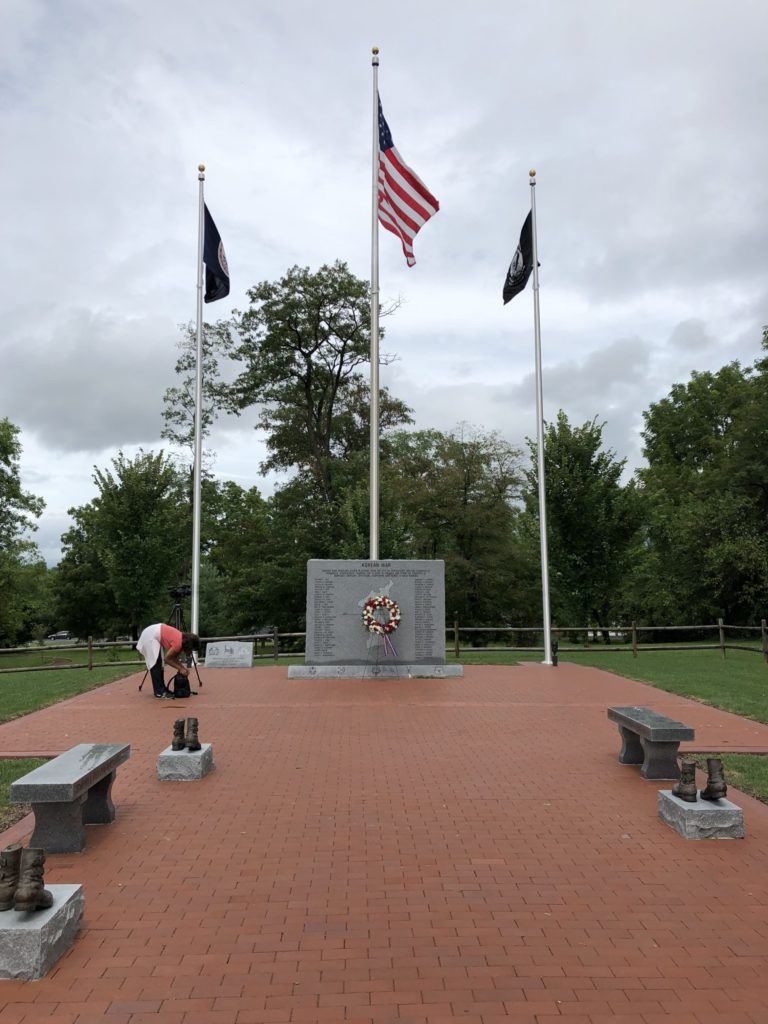Click on different countries and cities to explore Korean War memorials around the world!
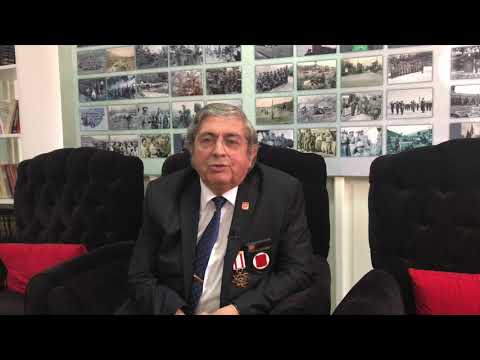
>> [FOREIGN LANGUAGE]
>> He's the leader or the president of his association, and he's a retired veteran.
>> [FOREIGN LANGUAGE]
>> "And I am a veteran from [INAUDIBLE]."
>> [FOREIGN LANGUAGE]
>> This association started in 1984 for the [INAUDIBLE] and Korean War Veterans.
>> [FOREIGN LANGUAGE]
>> This association started [FOREIGN LANGUAGE] the small room. In 2004, the government allowed this building to give ... Gave this building for the veterans.
>> [FOREIGN LANGUAGE]
>> And the current population of this building is 2,005 people.
>> [FOREIGN LANGUAGE]
>> And 200 people of these people are from the Korean War.
>> [FOREIGN LANGUAGE]
>> The youngest of these Korean veterans, he is 86 years old, and about 70 percent of these people can't even walk and are currently staying here.
>> [FOREIGN LANGUAGE]
>> This room is made for the Korean Veterans for them to meet once every week on Thursday to spend their time and meet with each other.
>> [FOREIGN LANGUAGE]
>> And from the objects they gave us ...
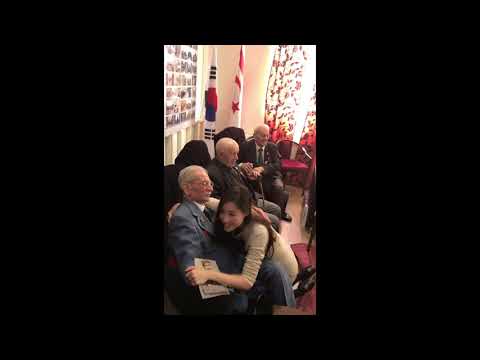
>> You saved. They remember you too.
>> [FOREIGN LANGUAGE].
>> [FOREIGN LANGUAGE].
>> He's really happy, and he's hoping that South Korea stays strong.
>> [FOREIGN LANGUAGE].
>> He's telling you that ...
>> [FOREIGN LANGUAGE].
>> [FOREIGN LANGUAGE].
>> ... when he went back to Korea, he realized the kids these days are taller and bigger [INAUDIBLE].
>> Aw, don't cry.
>> [FOREIGN LANGUAGE].
>> Oh, thank you. Do you remember me from 2009 when you visited Korea?
>> [FOREIGN LANGUAGE].
>> [FOREIGN LANGUAGE].
>> [FOREIGN LANGUAGE].
>> [FOREIGN LANGUAGE].
>> [FOREIGN LANGUAGE].
>> [FOREIGN LANGUAGE].
>> He went to Korea in 2012.
>> Oh, '12.
>> He didn't go in 2009.
>> [FOREIGN LANGUAGE].
>> [FOREIGN LANGUAGE].
>> [FOREIGN LANGUAGE].
>> When they were coming back from Korea, they went really fast.
>> [FOREIGN LANGUAGE].
>> When the plane landed really hard on the ground, all five of us lost our balance really hard, and it did to us something that [INAUDIBLE].
>> [FOREIGN LANGUAGE].
>> [FOREIGN LANGUAGE].
>> [FOREIGN LANGUAGE].
>> People who see us might look at his age, but he's still [INAUDIBLE].
>> Oh, thank you.
>> [FOREIGN LANGUAGE].
>> Thank you.
>> [FOREIGN LANGUAGE].
>> Okay.
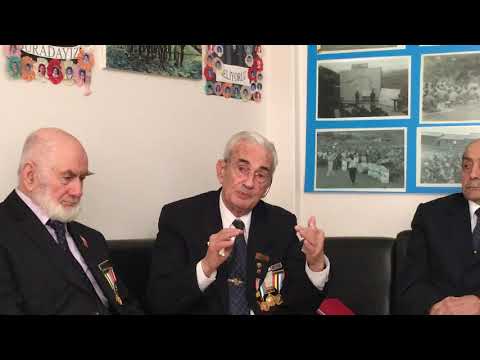
>> You saved. They remember you too.
>> [FOREIGN LANGUAGE].
>> [FOREIGN LANGUAGE].
>> He's really happy, and he's hoping that South Korea stays strong.
>> [FOREIGN LANGUAGE].
>> He's telling you that ...
>> [FOREIGN LANGUAGE].
>> [FOREIGN LANGUAGE].
>> ... when he went back to Korea, he realized the kids these days are taller and bigger [INAUDIBLE].
>> Aw, don't cry.
>> [FOREIGN LANGUAGE].
>> Oh, thank you. Do you remember me from 2009 when you visited Korea?
>> [FOREIGN LANGUAGE].
>> [FOREIGN LANGUAGE].
>> [FOREIGN LANGUAGE].
>> [FOREIGN LANGUAGE].
>> [FOREIGN LANGUAGE].
>> [FOREIGN LANGUAGE].
>> He went to Korea in 2012.
>> Oh, '12.
>> He didn't go in 2009.
>> [FOREIGN LANGUAGE].
>> [FOREIGN LANGUAGE].
>> [FOREIGN LANGUAGE].
>> When they were coming back from Korea, they went really fast.
>> [FOREIGN LANGUAGE].
>> When the plane landed really hard on the ground, all five of us lost our balance really hard, and it did to us something that [INAUDIBLE].
>> [FOREIGN LANGUAGE].
>> [FOREIGN LANGUAGE].
>> [FOREIGN LANGUAGE].
>> People who see us might look at his age, but he's still [INAUDIBLE].
>> Oh, thank you.
>> [FOREIGN LANGUAGE].
>> Thank you.
>> [FOREIGN LANGUAGE].
>> Okay.
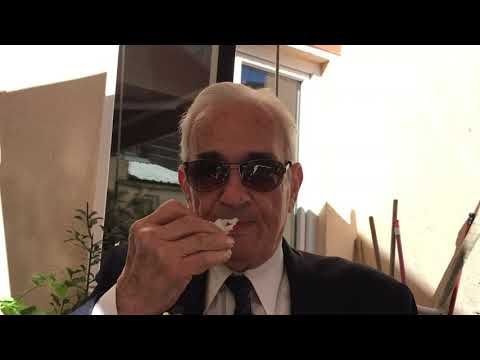
>> [FOREIGN LANGUAGE].
>> We were invited in 2010 to go to Korea with my wife.
>> [FOREIGN LANGUAGE].
>> When I was injured back in the war, I took an ambulance that went past the Han River.
>> One bridge [FOREIGN LANGUAGE].
>> There was only one bridge that was about to be collapsed.
>> [FOREIGN LANGUAGE].
>> But when I went back in 2010, I saw there were 29 bridges on the river, and I was really impressed.
>> [FOREIGN LANGUAGE].
>> He's saying all the Korean people are really polite and hardworking.
>> [FOREIGN LANGUAGE].
>> One day, they took us to a village.
>> [FOREIGN LANGUAGE].
>> It was 75 kilometers away from Seoul.
>> [FOREIGN LANGUAGE].
>> It represented Korea 100 years ago. They made a village to present that old time.
>> [FOREIGN LANGUAGE].
>> It was sort of a museum where they created a scenario of Korea 100 years ago where kids would go to learn about Korean history.
>> [FOREIGN LANGUAGE].
>> When I went there, I saw kids sit down in the [INAUDIBLE] and the teachers would explain them about the history of Korea.
>> [FOREIGN LANGUAGE].
>> And after the teacher told the kids about the stories, the kids started running towards us, and they started hugging us and kissing our hand.
>> [FOREIGN LANGUAGE].
>> There was one really handsome kid. I think he was around 13 years old.
>> [FOREIGN LANGUAGE].
>> He hugged me and kissed my hand.
>> [FOREIGN LANGUAGE].
>> And he looked up to me and said, "Atatürk."
>> [FOREIGN LANGUAGE].
>> And when I looked, the teacher was waving. She was waving her hand.
>> [FOREIGN LANGUAGE].
>> The teacher basically told them about the Turkish soldiers, how they lived thousands of miles away, but they came to our country and fought for us, and their leader was Atatürk, and she told this, and he cried.
>> [FOREIGN LANGUAGE].
>> I went to his mausoleum in Ankara, yes.
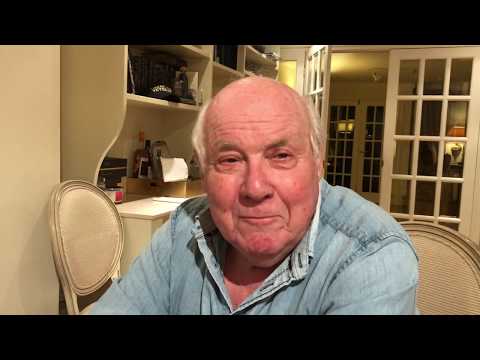
>> When I was in Korea, the sergeant told me to write pages [INAUDIBLE] for you, and I [INAUDIBLE] restraining regiment, and we had the signal hut which was this one here originally built by the Canadians on hill 355 which I think [INAUDIBLE] are in there. Oh, just jumping. That's when I first arrived in Korea all smart and signal office, and I first arrived there. You see it says, ,"Signal Office." Very naive, not knowing what to do, but, you know, learned very quickly. That's after about 3 months in Korea. See the difference between the smartness one and on after being in the frontline? Being in the frontline, do you see the difference in my dress? That's that. That's during the winter. We was just stuck in the ice. I figured [INAUDIBLE] was but we couldn't move, but we eventually got pulled out by a tank. This here, very difficult to see, very difficult to see, but these two photographs here, the helicopter is coming in to pick up the wounded, [INAUDIBLE] to I think it was the American mesh which we had to call in with coat signs and everything. That's me showing off with American carbine which I swapped with an American which must have frightened the Chinese North Koreans, must not it if they saw me there. This here is a Christmas card left on the barbed wire by the North Koreans and/or Chinese with toothpaste, razor blades, etc, etc, and the wording is very, very, very good because it's aimed in the English colloquial language, so once you start reading it, you understand what it's saying about American Imperialist, things like that. I'm not sure many more photographs that I think was taken in rest somewhere, you see. This is a story run by the Daily Mail in December the 27th, 2013 by a man called Tony Randal about the Korean War. "Bloodbath that nearly drowned the world," and he gives the political aspect of what communism was going to do if it really ran the world. So what I did, I wrapped this in paper, and I wrote this story. I wrote this little thing here which you may want to ... Should I read it?
>> Yes.
>> I was there. Please keep this for my grandsons, great-grandsons and all the descendants. This is what it looked like, and on many occasions, much worse. I shared a hoochie, a dugout, with other young servicemen, Brian who was 20 years old, a bit older than me. I was 19, and [INAUDIBLE] lived with his gran. One morning, 1952, he said, "I do not want to wake you up because the rats are eating their bars of chocolate, sandbags, next to your head, and I thought if you moved, it would jump on you." At 12:00 that day, he was dead. That's war, and that's what I put, and so I hope that descendants and descendants, descendants, remember. It really was the last real conventional war that there was, not that that made it any good or any better, but that's that. So this can be found in the Daily Mail archives on December the 27th, 2013 by Tony Randal, a historian which reminds people that war never achieves anything. It just takes the lives of young men, the cream of all societies whatever nation they're in.
>> [INAUDIBLE]
>> That's it. I [INAUDIBLE] national servicemen, but I do say they're just as scared as we are and didn't want to be there any more than we did. I'm glad we could help. Signing off. Young boy.
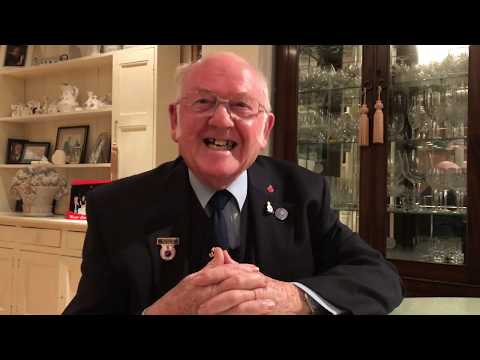
>> My name is George Reed. I'm a member of the British Korean War Veterans Association. I'm the secretary of the Hertfordshire branch. I went out to Korea with the war engineers, and it's a great shock. It was entirely different than being back in England, and I got posted up by the Imjin River [INAUDIBLE] engineer squadron, and we generally worked to do the reservicing roads and Korean work. The war had just finished when I had got out there, so the fighting had stopped. There was still plenty to do. I eventually became the squadron welder, and I built a 47-foot observation tower practically by myself, and then I got put into the intelligence section, was entirely different type of work altogether. Quite fun, I've done a few explosive jobs and blowing up. I've done some welding on the Teal Bridge, which would run ... crosses over the Imjin River. This was preparing for explosives in case the war started up again. I had plenty of work to do. I was very interested in most of it. I don't regret going out there. It was quite a different type of a culture, and, well, I bet we were. There was hardly any people at all because all the villages had been either destroyed, or they'd been moved back out of the danger area.
>> Did you know some of the comrades or people that went, fought in the British Armed Forces that fought but that didn't make it back? Did you know anyone?
>> Who fall down there?
>> Mm-hmm.
>> Yes. I was in the [INAUDIBLE] army before joining the regular army [INAUDIBLE] and there quite a few regular [INAUDIBLE] who fought out in the Korean War. They were very ... Was it posttraumatic stress? Two or three of them suffered very badly from that and what went on, but it wasn't recognized back in those days as such, so they were never treated, and they quite introverted to theirself. It affected them quite badly.
>> You were so young. How old were you?
>> How old was I when I went out? I was 21 when I went out to Korea. Being an engineer, it's a bit of employment. I was serving an apprenticeship for 5 years. I was deferred for joining the Army or doing national service for 2 years.
>> Explain that a little bit about the national service because it's a little different from other countries where everybody volunteered.
>> National service was 2 years, member, conscripted and then medical, and if they passed, they were sent out to different regiments, but I planned on being a military mind at that time. I signed on as a regular soldier, so it was all with national service. We don't have training with the national service, and it was all posted out with the national service with the different units around the world. I can't view it from a national service point of view because I wasn't a national serviceman.
>> But you served with them.
>> Yeah. Most of them were national service in those days.
>> How ... What do you think the proportion was?
>> In those days, it's over about 60 percent national serviceman in the British Army. I should say, not knowing these figures, but yeah. Looking back now, and what I've heard, I've met a few Korean people. I was in France 2 years ago, and in our hotel was a young Korean lady, and she thanked me for what we'd done out in Korea when we was fighting, so it ... quite lovely people there, very lovely people. Well, I think so. Yes, and I hope to be going out there in April of this year on a first visit for 62 years, all going well, hope to be there to see how the culture has changed, how the building changed because when I was there, Seoul was in a pretty bad state also the Gyeongbok Palace, which I remember visiting it if that's still there, but yes. I understand it's entirely different now, so going to compare the two different eras.
>> Well, I hope you enjoy the visit. I think you will.
>> Yeah, yeah.
>> I thank you.
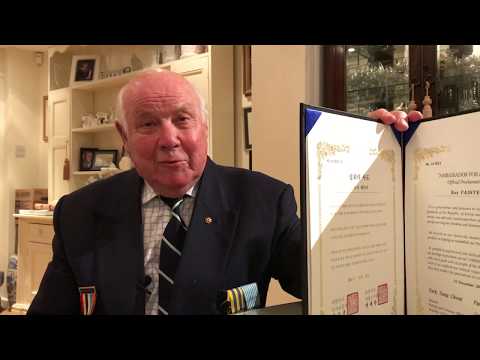
>> Hello. My name is Roy Painter. I'm a trustee of the British Korean War Veterans Association, and I served some time in Korea from 1952 to 1953 as a national serviceman. Most of the time, boring, some exciting, some of it very scary, but that was the way of the world then in 1952. I didn't think much of it when I came home, but now it means an awful lot to me when I see what the Korean people have done and very pleased and proud that it part of this regeneration of Korea, and I realized this. Now as you get older, you appreciate just how important it was that the part we played in the British Commonwealth Division and my colleagues. Forty-some of us never came back, like my friend Brian. He was only 20, who life dealt a bad deal, an orphan, in any case, was living with his grandmother, I'm afraid didn't come back and is still in the Korean cemetery. I suppose that's all part of war, and the bad things that happen, but the good things is that Korea is on its feet. The people are very generous to us, the Korean people, and it means so much to me that they have done this, and in some tiny cog in a bigger cog in a bigger cog, I played some part in it. Some things happened to me there. I went on a rest and recuperation leave, and I brought back a 1 yen. What that's worth now, I don't know. I visited a Buddhist temple while I was there, which, again, enlightened me. This is a couple of colleagues I had. That was me there, looking about 10 years old, but it was 1952, and we were all young and didn't care very much, some more photographs. The entertainers came out. That was a lady called Carole Carr, who was a very famous singing star in the '50s, and there she was. This here is my first introduction of working in the career, the signal office before I got sent up with the others and where it all happened, and this here is the ship I got sent home in, not much bigger than a Thames barge, actually, but there we are, but I've got some other things I could tell you if you want. Oh, this here, I was very pleased that I got invited back to Korea in November '14, and the generosity of the Korean people and everybody. The Ministry of Patriots awarded me the peace medal, and this parchment here, which I think I'm very proud of, which I hope in generations to come, my grandchildren, great-grandchildren, great-grandchildren will look and feel as proud as I am when I received this. Well, also, they fished out these Christmas cards from the American people. I don't think she realized it was going to an English person, but, nevertheless, it was a delightful, delightful Christmas card from a grandmother in America wishing us all the best and that someone was thinking of us, which I thought was very, very generous of them. I did reply to the lady, and I hope she treasures my reply as much as I treasure this Christmas card. Oh, and there's lots I could tell you, could go on forever, really. At 60-odd, the UN decided to declare war in Korea. Now most of the people in England didn't even know where Korea was. You got to remember the time. We were still on rationing. We were the poorest country in Europe still. We'd been bombed out. My father had been in the army for 5 years. My house had been bombed. We were sleeping downstairs in two rooms, sleeping on mattresses on the floor. By 1945, that was then. I left school in 1948, and, of course, in 1951, like other young men, I had to do 2 years' National Service, which I was called up. I went to various parts of the United Kingdom until some time in I think it was March when I was in there, when I was called into the colonel's office and told, "You're off to Korea." Korea was some Asian, some ... The other side of the world, which of course it was. Anyway, pack your gear, go home on leave for 2 weeks, which I did. Wound up in Liverpool on a boat, had 6 weeks of very pleasant trip to Busan, saw parts of the world I never would have seen. We slept on-deck, and we got to Busan, where we was introduced to Korea. Spent 1 week there getting acclimatized, and then we boarded a train to go to Seoul, and it took us 37 hours, stopping, starting. We got to Seoul, out of Seoul. We got on Canadian tracks. We then went another 5 hours, and suddenly the reality of it hit me. I could hear guns firing. I could hear bangs. Oh, dear, this is the reality, but we all made silly jokes and said silly things, and I got to where I had to go in the Commonwealth Division, was fed, watered, and we all had to swim in a local stream, got all the dust off us, and then I was sent to the signal office where I was introduced to the workings of what the army life was really about, and strangely enough, within 2 days, the first message I received was of a schoolmate who sat next to me at school had been wounded, shrapnel wounds, head, severity, severe. How small a world is it? Then the next 6 weeks, I got acclimatized to everything and became what I suppose was a working soldier. Sergeant then come down, said, "Okay, Painter, we're going to cook your goose. You're going up to the Aussies now," and then in a jeep over the Imjin River, carried on. The gunfire got louder and louder and louder, and suddenly reality started dawning. Oh, dear, this is what it's all about, and I went until I was attached to the first World Straits Arrangement, and I was introduced to the colonel, and the sergeant, he was a grisly old Aussie who had been in the army for years, said, "This is your new English operator, a pommy," he said because they called English pommies. This is your new pommy operator. Wise operator said, "If you don't mind me saying so, sir," he said, "I think the poms is still sending us kids. They're still shipping young one on their mother's tit. They all look kids." Anyway, it was a start of a 3-or-4-month acclimatization. I learned very quickly to tell the difference between outgoing shells and incoming shells, but it wasn't that bad because everyone else was used to it. We did guard duties, and I was always impressed by the clarity of the sky at night, especially in the winter. It was so clear and clean-cut, and I looked at the stars, and I thought, "Wow," and I should try and work out in my head how far away it was to go home, 6,000 miles. If I walked it, could I walk through Mongolia? But then a routine settled down. I was a wireless operator, and you spent 6 hours on-duty, 6 hours off, but mostly it was fairly easy until sometimes, things got slightly naughty, and mortar bombs started landed on us, but it only lasted a few minutes, but it still used to make you scared, and people said they wasn't scared are telling fibs because everyone gets scared, but then you did guard duties, and you'd look at a bush, and you'd think, "Is that bush moving? Is it someone really there?" And I said ... I think peoples turn to religion. We all make false promises, and the shells we'd land on said, "Please, god, don't let them come any nearer. I will go to church," knowing I wouldn't, but time passed, and then I got attached to the Americans, and that was a lot of fun. They had food I'd never seen before, chocolates and steak and ham and eggs for breakfast. It was unbelievable because you have to remember that England was still on rationing. We were still on starvation rationing in England, but sweets, and time went by, and suddenly I'd been there almost a year, and I went on one leave in Tokyo, the rest and recuperation leave, which was fun, 5 days, lots of boozing and things like that, but that's what young soldiers do. Isn't it? And I came back, and where I could ... It did change my life. I remember looking a the Koreans, and I can remember them opening up a tin of bacon. It was a big tin. It was bacon inside. They took it out, and I remember saying to my mates, "Korea will never go back to being peasants again. They've moved 400 years in 2 years. They've seen now what the rest of the world has got," and I can remember these two young Korean guys taking the bacon out, and I thought, "They're eating the same as us, wearing the same clothes." Of them, those that were lucky enough to be with the Americans got all the goodies. They don't want to go back to eating rice and fish. Korea is going to change. They're going to want what they're ... and quite rightly so. It was a few moments. We never saw many civilians, but I can remember one was a Korean peasant lady who was way down in line, and she had a baby strapped to her back, a little boy, and as most soldiers do, I wasn't mean. I gave him two bars of chocolate, and the gratitude of the Korean mother was so immense that even at 19, I was moved that for two bars of chocolate, life should not be like this. People shouldn't be treated like this, and how could the north come down and raze these villages to the ground and kill people? I suppose it was part of my growing-up process. Wasn't it? This was wrong. This was wrong, and was I pleased I was taking part of that, of helping? And eventually time came, time to come home, and I did, and I must confess. I put it out of my mind, Korea. I put it out of my mind, but occasionally on my own I would think about it. I'd think about it. It never ... People say they have, what, post-traumatic ... I don't think it ... I had a few sleepless nights. I would wake up, and I wanted one experience, this, okay? When I went to an army camp in England some years ago, and they'd recreated the 1914 war with sandbags and shells, and I went through, and the shells started whistling, and my stomach did turn over. My tummy turned to water, and it brought back memories, but I soon got over it, like most people decided. I'm not sure about post-traumatic stress, but if people suffer from it, then I feel very sorry for them, but then I got a phone call in the ... oh, dear, from a man called Rod Larby. He said, "I know if you don't like to see your man's grave, Brian Clackett." And of course, the memories come flooding back. I said, "No," and Brian was only 20, and life dealt him a bum deal, which I think I said earlier. He was only 20, and he was an orphan. By 12 o'clock, he was dead, and so I became involved in the British Korean War Veterans Association, so I'm going to meet my old pals, told lots of lies to each other, didn't we? As we always did, but they were older. You remember some of that. Do you remember him? Do you remember him? Until eventually I went back on a revisit in November 2014, and I'm so pleased I did. The change in Korea is just phenomenal. They're the 10th largest economy in the world now, and if winning this war in South Korea could do this, why can't North Korea? Why can't other nations use this industry and do good things? Anyway, on the revisit, they arranged for me to see Brian's grave, and I must confess. I did get emotional in this time because it shouldn't happen to a 20-year-old, but I saw his grave. The graveyard is kept absolutely immaculate. The Korean people are ever-thankful. I don't mean grateful but thankful, which is nice, and isn't it a pity that the north is still the same as it was? Isn't that a shame? Isn't it? You'd think that ... words fail, especially with this lunatic in charge keeps his people in servitude and slavery, and we can only hope that all the people that died didn't die in vain, and that Korea becomes one nation. It's leapt from 1600 to the year now 2000. I can't believe it can carry on as it carries on now, and all these people died for nothing. You know? Fifty-six thousand Americans, over 1,000 Brits died and 1,000 were taken prisoner, and let's hope that we can all learn that man's inhumanity to man can't go on, so now in my 80s, am I pleased I did it? Oh, absolutely, I'm pleased I contributed in some way. I made friends and comrades I would never have made. I experienced something I would never have experienced before. I was privileged, just privileged to take part in some tiny call freeing South Korea from the yokes of North Korea, and so, really, I can go to my grave saying, "Well, I did contribute something to the world, albeit forced to do it but pleased to do it," and let's just hope that in my lifetime, Korea can unite. One thing I did forget was on Christmas 1952 at midnight, all guns stopped firing, which just very quickly became an eerie quietness. It was like, but on Christmas morning, strange enough on the wire before the minefields, the Chinese or North Koreans had left Christmas cards and little presents like toothpaste, razor blades and other things, and the Christmas cards were specifically worded for English. Hello, lads, merry Christmas. I hope you're enjoying some presents, but do you really want to fight for the American imperialists? While you're here, they're taking your girls and wives back home, and you're fighting a useless war. Do you really want to fight this war? What they didn't realize, it was counterproductive, of course, because we all laughed. It didn't really have any effect on us at all. We just laughed because we could see through this propaganda. It didn't really affect us. I will look for this card again because a picture is worth 1,000 words, so I hope I can find it and some other, but, of course, I wasn't expecting this, so I really don't know where I've put it, but I really must try and put this all in order for future generations.
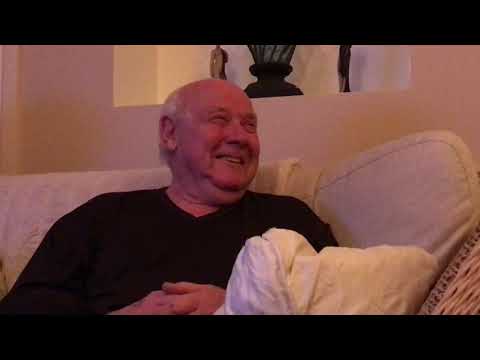
>> [INAUDIBLE].
>> Because it didn't go like that. It wasn't on the spring. Each time, we had to wrap it round and ...
>> And because it was crystallized, you had to break it up.
>> Yeah, trying to start it, but now you've got more springs, haven't you?
>> Oh, yeah.
>> This time you had to keep wrapping it around, pull it, pull it again.
>> Until ...
>> Oh, and it wouldn't start, and I could hear the guns firing, and I thought ... and I could hear the radio going because we had batteries, and I couldn't answer it ..
>> Because you're trying to answer back.
>> But I can't right now. There's no power.
>> So you had to keep doing ...
>> No power, and you couldn't have the generator inside to keep warm because the fumes would kill you, wouldn't they, of the generator?
>> Yeah.
>> So you have to have the generator outside, and, oh, my fingers were cold, and it was so cold, and it wouldn't start. I thought, "Oh, I'm in such serious trouble here. I'm in serious trouble." Vroom. All of a sudden, it was all [INAUDIBLE].
>> And then ...
>> Then it went. Oh, and I got in the air. Hello, whatever it was, Newcastle One. Hey, you read me? Over. Read you fives and clear, duh, duh, duh. It was fine. But if you look, that was the night of the Battle of the Hook. Think it was October, was it, '53? You got it there?
>> No, I'm recording you.
>> Oh. And it was Battle of the Hook. If you put it on there, Battle of the Hook, you'll see it.
>> Yeah, yeah, I will.
>> And that was ... And the journey started. But I remember the night was so crystal ... You know when you get that clear air and all those millions and millions of stars because it was so clear, the air, and I could hear all the mortar bombs landing on the Hook and things like that, and I didn't realize what a pounding they was getting, and that was it. If you look it up on there, Battle of the Hook ...
>> We will.
>> Oh, by the way, since you were in the National Service, you did get paid, right?
>> Oh, yeah. When I first went there, I got a pound a week.
>> Oh.
>> One pounds, but the average wage was about ...
>> Relevant to the day, I suppose.
>> The average wage was about 3 pounds.
>> Oh.
>> And I got paid a pound. Then it went up to 2 pounds, I think. By the time I come out of the army, I was what they called a five-star soldier.
>> Oh.
>> Five stars. I didn't have to pass any exams, and I was getting 3 pounds, 10 shillings, and for fighting in Korea, I got 82 pounds bounty, 82 pounds bounty, which was ... In '53, it was a lot of money.
>> What is that now?
>> What?
>> What is ...
>> Eighty-two pounds bounty in ... The average wage was, say, four quid.
>> Yeah.
>> So it was what?
>> So the average ...
>> Four into 80 would be 20 times, wouldn't it? So 20 times ... Say the average range is 300 now. Twenty times 300 would be 6,000 pounds. No, it wasn't 6,000 pounds. It would be worth, I don't know, couple of thousand quid now.
>> Yeah, today.
>> It was called a bounty. I didn't get it until I went home.
>> So it's 1,000 times what ...
>> Yeah, yeah, yeah.
>> It's 1,000 times better than ...
>> For, yeah, bounty. It was bounty, yeah.
>> So you were adding 1 pound ...
>> But remember, I never spent any money for a year.
>> Yeah, because you would have nowhere to spend it.
>> It's like being in that field. You can have 10 million pounds, but you can't buy anything if there's nothing to buy, can you?
>> No, so you saved it.
>> I got free cigarettes, and I didn't smoke.
>> So you saved ...
>> You got free cigarettes, 15 cigarettes a week in tins, and then you got a menu called C-rations. [INAUDIBLE] C-rations, you got bone chicken ...
>> Yeah.
>> ... toilet paper, matches, four cigarettes.
>> What did you do with the cigarettes you were given? You were giving them away?
>> He traded. He bartered.
>> You bartered?
>> No, we played cards with it.
>> Oh, were betting.
>> I'll raise you 1,000 cigarettes.
>> Oh.
>> But also we had a Korean guy with us when we were down, and he would do our washing, and you'd give him ...
>> Some cigarettes for the washing.
>> You would give him 300 cigarettes, and he would go to Seoul and sell the cigarettes. He would sell the cigarettes.
>> It was bartering for service.
>> Yeah, yeah. He was ... And he would smash it against the rocks, get the stuff clean, but of course, that was back down the line. When you was in the line, you'd get ...
>> Take it ...
>> So ... But I didn't think it ... Looking back now, I go ... I didn't view it as being bad.
>> It wasn't.
>> I didn't view it ... I viewed it ... That was ... Like Bill said today, I viewed it ...
>> Mm-hmm. As part of ...
>> That's how it was.
>> That was how it was. We ... That was it. I didn't view it, "Oh, look at what they're doing to me," because everyone else ...
>> Yeah, everyone else was doing it.
>> Everyone else was doing it.
>> Yeah.
>> And it was lots of fun there as well. We'd ...
>> You're in it together, so there's no one ...
>> I remember this American. We were swapping, and a STEN gun, British STEN gun, which was terrible, and it cost the equivalent of $1 maybe, and so I fired his carbine, and he fired it. He went, "Man, that's the sweetest dollar's worth I've ever seen." So we swapped guns. I took his carbine, and he had my STEN gun. Carbine was much better.
>> Yeah.
>> And so I didn't view it as, "Oh, terrible." It wasn't terrible ...
>> It wasn't at the time.
>> ... because it's ....
>> Relevant.
>> It was relevant at the time. We all ... We laughed. You joked, and you made jokes, and you read books and read, read an awful lot.
>> And it was an adventure.
>> Yeah, right, and I said ... We had a radio, of course. We had the radio up. We could tune into the radio, and we used to tune into the radio when it was the March of Dimes. Give a dime today for a Korean orphanage.
>> What was your favorite song again?
>> Oh, there's lots of [INAUDIBLE].
>> Really? Really there was ...
>> Favorite songs at the time?
>> ... March of Dimes for Korean orphans, really?
>> Yeah. They said, "This is the March of Dimes. Give a dime today for a Korean orphanage." They're the March of Dimes, so you know it's ...
>> In the British radio stations?
>> No, we picked up the American radio because I was on the radio.
>> The American.
>> We never had a British radio station. Only the Americans had their own radio station. This is ... Songs was ... [Lyrics] Way back home, we lie. We used to laugh at the Americans being all sentimental. We weren't, but they was ... It was like going camping with them maybe for a year. Imagine going camping with that [INAUDIBLE].
>> Shooting down.
>> Yeah, no. Imagine going camping for a year and ...
>> Yeah, an expedition, sort of adventure.
>> Yeah, but trouble is sometimes you run out of food because no food was coming up.
>> So you had to ration.
>> You had food, and you had these C-rations most of the time, which is a pack like that like you could buy at the supermarket, bit of chicken or meat wrapped in almost ... It was toilet paper, cigarettes, matches, maybe a piece of cake or something like that. My mom sent me a parcel, a big parcel at Christmas. On Christmas '52, we had the highest ranking general in [INAUDIBLE] come and see us because we was the most forward of the British soldiers in Korea, and he come up to see us, and he come up to see us, and I had this big parcel. So I go, "Cup of tea, sir?" "Yes, I'll join you lads," and his gloves were rolled back, and he had this camel-hair overcoat on. His hat, boots, brown boots glistening. He really looked smart, he did, and, "How are you finding it, lads? Getting tougher?" "All right, sir." "Well, chin up."
>> What did you guys think of MacArthur?
>> He was gone by the time, I think, I got there, wasn't he, MacArthur? Was he?
>> He was fight ...
>> He might have just been there. I think ... MacArthur, General MacArthur?
>> Mm-hm.
>> No, when I got there, he was general ...
>> Eisenhower?
>> No, no, no, no, general ... No, the general took over from him. There was another general. I have to think about that because MacArthur wanted to drop the atom bomb, didn't he?
>> Mm-hm.
>> And they took him away. Then they took him. There was another general. I forget his ... There was a man they called Iron Guts somebody.
>> That was his nickname, Iron Guts?
>> Yeah, another general, Iron Guts someone. I'm trying to think who the other American general was. I forget. There was another general, American who took over.
>> Nevertheless, what did you think of MacArthur?
>> I didn't give it a thought, quite honestly, although you've got to remember, he pulled a master stroke, didn't he, the Inchon landings. He pulled a master stroke. Here is Korea, and we were down here, and there was the Chinese. What he did, he landed all the troops there In Inchon and cut Korea in half so they was all trapped.
>> Oh, yeah.
>> It was a master stroke really. He really landed, and it had a 15-foot tide. This place called Inchon had a 15-foot tide, so they had to time it ...
>> Perfectly.
>> And that was British marines in there at the time, but it was tragic. When they got there, they took it without almost a shot being fired, but nevertheless, [INAUDIBLE] landed so much, and they just cut it in half. So it was a master stroke. What was it, 1951, was it? Late '51, I think it was.
>> '50.
>> General, general, but there was ... As I'm talking, I'm remembering things that I ...
>> September.
>> September of 1950, was it?
>> Mm-hm.
>> I wasn't there then.
>> You were '53, weren't you?
>> No, I went there '52 because MacArthur sat ... because he really did that to Truman, didn't he? Truman had to go and see him rather than him go and see Truman, and he fired him, but he got a hero's welcome, didn't he? Ticker tape in New York, and do you know he had not been back to America for something like 30 years?
>> Mm-hmm.
>> He had not lived in America for 30-odd years. He had been in ... And you know that photograph of him walking up the beach? I've read the story. He walked up the beach. There's a famous picture of him with a cob pipe in his mouth walking up the beach. When he left Manila, he said, "I shall return," okay? And they had a picture of him walking up the beach, but that was a mistake. The boat wouldn't land, so he had to get in the water, and he cursed and shouted, and the guy took a photograph. Of course, he ... And it's really ... He cursed and shouted. He had to walk up the sea, but of course it became a famous photograph like he's walking up the beach, isn't it?
>> Like a holiday brochure.
>> Well, yeah, like he's returning, walking up the beach all ... And yet he was actually fuming. He was actually fuming, but then it took ... But he hadn't been back to America for 30 years, MacArthur when the Japanese took Manila and all that, and he sailed southeast. He never went back to America so ... He was going to run for President, wasn't he? He thought he was going to be President, MacArthur.
>> When he went back?
>> The reason they sacked him, he wanted to drop the atom bomb on North Korea. Had he done so, it would've been ...
>> Catastrophic.
>> Would've been catastrophic. Russia would've done it, but it was ... So as you talk, you remember things, don't you?
>> Mm-hm. You have to all write it down and finish your essay. I'm urging him to finish his essay.
>> I've got another piece I want to fit in.
>> [INAUDIBLE] bar cream.
>> Let's get this week over, and I think I'll cut everything else out and just do ...
>> The key to it is to ...
>> ... the story of my life.
>> ... write it down when you remember it, right?
>> Yeah.
>> Well, sometimes when I'm writing, it comes.
>> That's true, too.
>> Going back.
>> The story ...
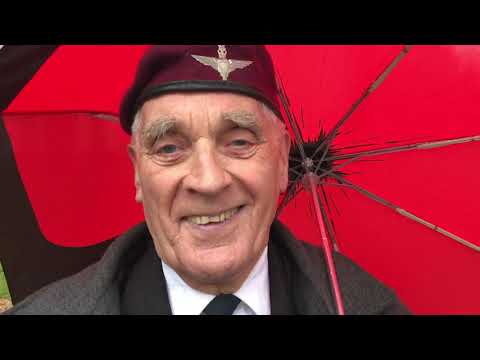
>> That, of course, is when I was boy. When I was 14, I was boy. I went in the Navy, so that's me ... That's GMS Ganges, nothing to do with Korea, me hat.
>> [INAUDIBLE].
>> Wow, it is.
>> Yeah, well, [INAUDIBLE].
>> Their badges is the royal signate.
>> No, it's not.
>> Oh, sorry.
>> Wrong signal, wash your mouth out. It's the REME. That's the Royal Electrical and Mechanical Engineers.
>> Hello.
>> And that's the badge there. Right. Now he's Royal Signals.
>> Royal Signals, and what does that mean?
>> Communications.
>> Oh, so your badges all indicate what you ...
>> Yeah. Mine was repairs ...
>> Hello?
>> ... maintenance of old vehicles and equipment, that's REME, Royal Electrical and Mechanical Engineers.
>> How about his?
>> He was Royal Engineer, slightly different.
>> What is that?
>> Pardon?
>> What your regiment badge is?
>> Your badge.
>> He's Royal Engineers, Eamus.
>> Yeah.
>> What does that signify?
>> Paratrooper.
>> Oh.
>> RAF Memorial.
>> I was in the 27th Brigade. That's all of them. That's the Canadians, Australians. That's the New Zealanders, Canadians, and that's two badges there, and that's a one-eyed ... That's a good-luck charm, that is.
>> Oh.
>> That's what Mr. Shoveling give me when you got to see him.
>> You've got here too.
>> Oh, that's ...
>> Turn his badge around.
>> Oh, got around the other way.
>> Beautiful.
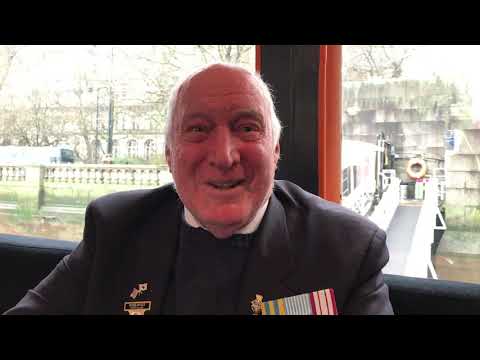
>> My name is Roger Astley. I live in Finchley, North London, and I was in the Royal Navy during the Korean War. I joined the Navy as a boy of 15, and I was obviously there during the Korean War on an aircraft carrier, HMS Unicorn, which transported new planes and brought back to Singapore the old ones that had all been smashed up or crashed in, whatever. We also provided new pilots for them, and we took everything up to Japan anyway, to Sasebo, including two London buses. I think it was a morale booster for the troops to see a London bus driving round Korea. That's it for me. Wait. All right? Wait a minute. Anything else you want?
>> Well, so what did you experience there? I know what you did.
>> All right. What did I experience?
>> Anything that you saw, kids, orphans or other units, Americans?
>> No, we took everybody. We even took American sailors up there on our ship, and they loved our food, which I'm afraid that the English didn't like our food, but the Americans liked it, which was quite unusual because I went on American ships, and I always thought their food was better than ours. We got on all right, and even when we went ashore drinking, and we'd had a few drinks, a few beers and was beginning to talk, we got on well with the Americans as we did with most of the others.
>> Like who?
>> Well, there was Australian troops there, Belgium. There was a Dutch hospital ship. In other words, there were quite a few other nations. The harder ones, obviously, was the Oriental nations that was there. That was harder for us to get on with them.
>> Because of the language barrier.
>> Yes, basically, whereas with the ... Obviously the most people in the world speak English away, and us English, especially myself who has an accent from the North of England, we don't speak English as good as we should do, but it was an experience. I don't think we was ever frightened. We was only attacked three times by aeroplanes, and we chased them off, but we didn't have any trouble. Apart from that, you just did your job. You just carried on doing what you did.
>> So what do you feel about Korea right now as compared to what you left it?
>> Well, I'm glad it's getting more affluent than ... It's a machine country now, I should imagine, from what it was then. In fact, I think it was the making of South Korea in a way because it's very modern in everything. It's good that they do, and their exports is good whereas I don't know so much about the North, but I don't think it's doing anywhere near as good. Even the Chinese seem to be a bit sick of them. But apart from that, yeah, I've got good memories of it.
>> You do. Have you returned?
>> Pardon?
>> Have you ...
>> I have never returned, and I always used to be amused at one of the ports we went to, I think it was [FOREIGN LANGUAGE], one of them, there was a great big notice on the roof of the warehouses, "Through this port passed the best damn fighting men in the world." That was the Americans, of course. Well, of course some of our people climbed on the roof and put, "And the Brits." And it was just a job at the time. I think because we never really got ... saw action like the Army did, to us, it was a job with a bit of restrictions in it. The ship could never broadcast its name. We all had different call signs. You couldn't let the enemy know what ships was there, so we had different call signs, but for the Navy, I don't think ... It was a few early on got killed, but most of them didn't. Most of us was too far away. It was the Army took the brunt of it, and of course they weren't professional soldiers anyway, a lot of them, as you see, there's lads had to go in for 2 years training. Well, there's people like myself and the majority of the Navy was all time-serving people. And of course when I got out of the Royal Army, where I lived, a seaside resort, I went back to sea again in the Merchant Navy where I could go to the West, to Americas and South America and the West Indies, and in other words, I had a good life.
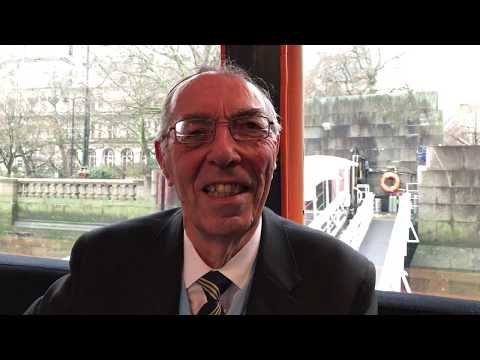
>> Richard Davie, member of the British Korean War Veterans Association. I served in Korea 1953, and I initially was posted there. I went over on a fast ship which only took 4 weeks, and when it arrived, the First US Division, Infantry Division was playing the band as we arrived in Pusan. I posted up to headquarters at the Royal Artillery, and after 3 weeks there, I was attached to the First Field Artillery Observation Battalion, United States Army, where I was sending map preferences of the Chinese guns back to headquarters. And we had six-figure map preferences or possibly eight-figure occasionally so that they could be fired upon as kind of bombardment. Questions?
>> Well, so what do you think is the British participation ... the significance of the British participation?
>> It was more or less made a direct line between Pyongyang and Seoul where the division was at the time I was there, and we had ... The last biggest battle was at the Hook, in fact, has been said that that would be the last battle of any ... with any two great armies fighting each other that the world has ever seen, the last Battle of the Hook, the Third Battle.
>> When was that?
>> That would be, ooh, right about June, May-June time 1953. After truce was signed, I went back to HQRA for a while, and then I was sent to a unit where we did all the paperwork for the prisoners of war as they were released.
>> Whoa, can you explain that? No one has ever told me about the POW process.
>> No, well, it was just our little unit. Basically because we were drawn in from several places into HQ, I think they were wondering what to do with us, so they sent us down to the center Canadian hospital unit, and all the British POWs who came through, we took down details of them, who they were, the Army number and messages for them to send home, which we wrote down, and these were coded messages because the only long-distance writing in those days was Morse code. So it was turned into code, then switched to be recoded, retranslated when it got headed back to this country.
>> And what did you do in the process?
>> Well, I was taking down the names and the addresses and everything for them, all the paperwork.
>> Have you been back to Korea?
>> Yes, went back in 2001.
>> Hmm.
>> And it's amazing, the difference.
>> Explain a little bit.
>> Well, everything is so modern and things so industrious and so going ahead with everything. My grandson went over on the UN Peace Camp last year, and as a result, he's very keen to go again, and he's just going to start a course at university in Seoul in March this year.
>> That's cool. So what do you think of the Korean people?
>> Oh, they're lovely. They're so hospitable.
>> We're very grateful, that's why, grateful for your service, grateful to the country and all the other United Nations service that fought, and again hopefully there will be peace on the peninsula.
>> Yeah.
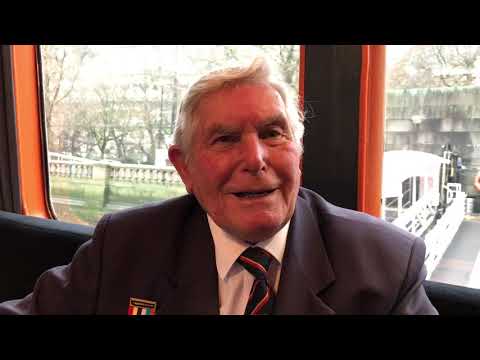
>> My name is Victor Smith. I'm part of the committee of the British Korean War Veterans Association. My position is National Treasurer who looks after the finances. We have approximately about 250 members. This was after the collapse of the original British Korean War Veterans Association, and we formed out of the members that wanted to carry. It's very successful. We're growing year-by-year. The old organization closed in 2013. That's when we started, and over ... We've made great steps in the 5 years that we were ... 4 years that we've been in operation. What else would you like me to say?
>> Just how many served from Britain.
>> Oh, the servicemen from Britain that were killed in action was 1,078. I think there was over 1,000 that were captured, and altogether, there was about 30,000 went to Korea from Britain. The reason that we only did one winter because of the cold winter, extreme cold, whenever you got there, you could only go 12 months that included one winter. The conditions were pretty basic. Spares ... I was involved with maintenance of vehicles and tanks. To get spares and equipment was very, very hard. We cannibalized one vehicle to keep another vehicle going. Any that we couldn't deal with, they were taken to Inchon and shipped to Kure in Japan where the Japanese had workshops that repaired all the vehicles. That was under the REME. I was actually a member of the REME, which is the Royal Electrical and Mechanical Engineers. They're mainly workshops, but within each unit, there's always a REME craftsman attached to the unit. I was attached to the Tower [INAUDIBLE] Infantry, and then I was passed onto the Royal Warwickshire Regiment. On my end of service in Korea, I then moved around to the Suez Canal and spent 6 months on the Suez Canal, and then I ... My 3 years was up. Anything else?
>> Have you been back to Korea?
>> I have been back the once. I hoped to go back this year. It was a wonderful experience to return there, and I'm looking forward to going back again.
>> And I'm sure when you went to Korea, many Koreans expressed their gratitude, right?
>> Oh, yes. They treated us like gods. They're absolutely wonderful to us. They're so kind, the Korean people.
>> When you see that, that the South Koreans and Koreans all over the world are experiencing, enjoying freedom, and North Koreans are not, what do you hope for the people of the Korean Peninsula.
>> Well, I hope they'll unify. I believe there are still people that work from the South work in the North and from the North work in the South. I think they travel there daily. I'm not sure, but it wants complete unification and peace, and absolutely, it's a wonderful country to visit, wonderful people. I thoroughly enjoyed my time out there.
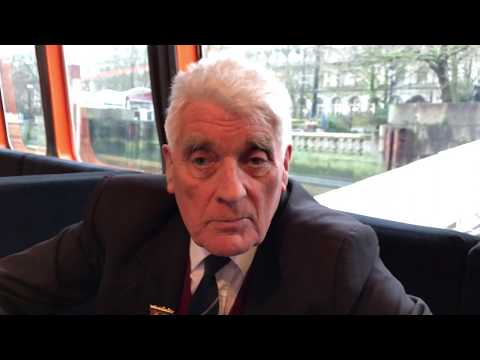
>> When I got to Korea, they left me in Pusan. They sent me to guard company which is east of Pusan, and we were doing guard duties all around the docks, closing depots, ammunition depots, and I stayed there from September right around until February when they sent me back to the Battalion, Royal Fusiliers, First Battalion, the Royal Fusiliers, that was. That's when we stayed until the ceasefire.
>> Explain a little about that because, I mean, you didn't expect the ceasefire, but it happened. I mean, like, how did people react?
>> Well, we were just happy, I suppose, but we were due to come out then because our stay was only for a year, so we're due to come out anyway, so we came out normally.
>> Why were you only scheduled to stay for a year?
>> Well, I think everybody got a year minimum probably.
>> Well, explain a little about that because I think British were the only ones maybe, not the only ones, but with the National Service.
>> Well, I was a regular. I was in for 5 years, so it didn't fly to me, but there was a lot of National Service in there. That's why they encouraged it to 2 years when the war started.
>> Have you been back to Korea?
>> Yes, 2000.
>> Oh, for the 50th anniversary.
>> Pardon?
>> For the 50th anniversary.
>> Yes, that's right. That's correct, 50th anniversary. Now, I want to go this year again if I can with my grandson, and ...
>> What did you think when you first arrived?
>> Well, it's a big improvement, big improvement.
>> Well, I hope so because it was ...
>> Nothing.
>> ... nothing but rubbles when you left it.
>> That's right. It was only two bridges on the river Seoul. Now, there was 27 I think, 30. Big change, big change.
>> And do you feel proud?
>> I do. I do feel proud, and since 2000, I've carried your national standard very proudly and honored to do so and still carrying it. I'm going to carry on as long as I can.
>> Well I know for sure the Korean people and the people everywhere are extremely grateful for your service.
>> I'm sure you are.
>> Yes. That's why I'm, here.
>> Yeah.
>> And thank you so much.
>> Very proud to see you.
>> Thank you so ...
>> Thank you for coming.
>> Thank you.
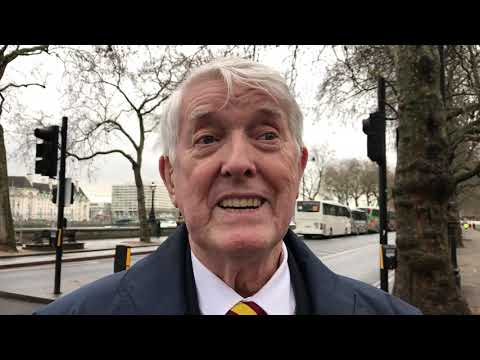
>> Right, my name is Edgar Green, and I was in the Middlesex Regiment, which is one of the first of two regiments to go from Hong Kong to Korea. We served in Hong Kong ... Served in Korea from the perimeter of Busan right up to just below the Yellow River, then down again to Seoul, mainly walking all the time. We're very ... No transport, and the worth thing was the lack of warm clothing in October when the temperature dropped to 40 degrees below. We stopped until the Battle at the Kapyong and 29 Division was in the Imjin River, and then May of '51, we returned to Hong Kong, and that was more or less my time, and then 6 weeks in Hong Kong, and I was back to England to get [INAUDIBLE], and that was my army service there. How we looking then?
>> Have you been to Korea? Have you been to Korea?
>> I've been back to Korea nine times, and so this year, when I go in April, that will be my 10th time that I've had a birthday in Korea, which I look forward to because I remember all of those friends as they were and comrades that are left down in Busan, and that's why I go every year to see. Thank you.
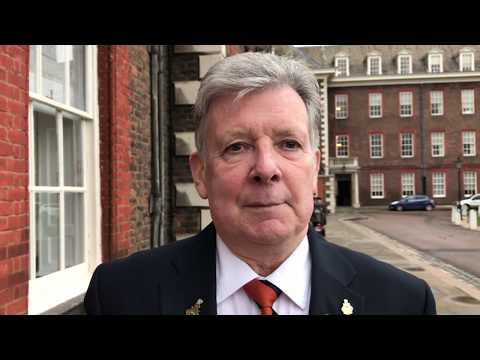
>> My name is Brian Morney. I served with the First Battalion of the Royal Sussex Regiment, and I was in Korea for 1 year. I was stationed just south of the Imjin River, not far [INAUDIBLE] and the glorious Gloucester Hill. I was there from 1956 to '57, which was postwar, and we were the last British Regiment to leave South Korea, and we were on active service at that particular time, and during that time, we had 200-man marches through Korea, which 25 miles a day for 4 days, and we did that twice. On one occasion, we had a very, very big parade at our army camp, and that was attend by Syngman Rhee, the president at that time of South Korea, and he arrived at our camp by helicopter, which was quite an occasion for all of us. When I went to Korea, because of the state of South Korea at that particular time and the poverty that I saw, I wasn't really interested in ever coming back to Korea again ... Excuse me ... Because I thought that the people were so poor and hard done by. Sometimes, it made you cry, but I've been on a revisit to South Korea, and now I think it to be one of the nicest countries I've ever been to. The people are so hospitable and really caring, and I can't speak highly enough of what Korea has done in that short space of time, and if I ever have a chance, I'd love to go back to South Korea and to visit all you lovely people once again. Thank you very much.
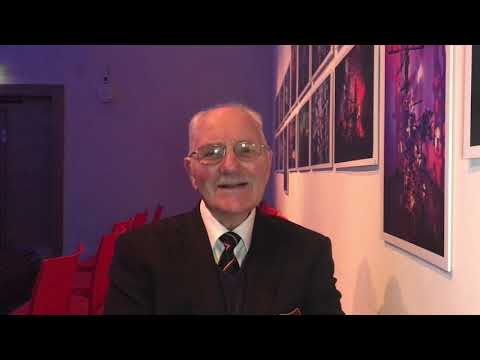
>> My name is Alexander Ferguson, known as Sandy. I was in Korea during the Korean War from 1951 for 2 years. I was with Royal Electrical Mechanical Engineers doing recovering, recovering tanks and suchlike and were based in various places: Incheon, Seoul, Daegu, a number of places. And there is such a tremendous friendliness about the South Korean people, who were so kind to us. I can't ... Anything else?
>> Well, so when you went to Korea, what do you remember?
>> I remember the fact that [INAUDIBLE]. I hadn't seen those before, and the oxen who'd carry, were pulling carts about, and the A-frames the gentlemen the gentlemen were carrying about, [INAUDIBLE], and the roads, the condition of the roads. They seemed to be years and years behind the times at that time. I don't mean to seem unkind, but it did seem very, very behind times then. I'm so pleased to see how Korea has come on now. In fact, I drive a Korean car. I remember different instances, rescuing tanks and backloading vehicles in Incheon to go to Japan when we agreed it was beyond local repair. And meeting the various different sections of the army, and different ones did different things, such as RASC. We saw them doing their work, supplying stores and things, the engineers building bridges and ourselves recovering and repairing vehicles. I can't think of much else at the moment.
>> Well, what do you think about the Scottish contributions in the war? Not a lot of people know about it.
>> Well, there were a lot of Scottish people in the regiments, in the infantry regiments there, which we're very proud of, but I wasn't with any infantry, although we did rescue vehicles from Gloucester Valley. It was known as Gloucester Valley after ... There was quite a large battle there. The army were called the Glorious Glosters. Yeah. Scottish people were ... There were only a few Scotsmen in there, in our unit. I think there was three Scots in it, and there aren't as many people in Scotland as there are in England in any case, but we ... Scotland was well represented in the infantry units. I think that's all I can think about at the moment.
>> How did the war impact your life when you came back?
>> When we came back, we got about 3 months leave of absence when we came back because we had only 5 days in Tokyo while we were ... All the time we were in Korea, we had only 5 days R and R, and we went to Tokyo and to Ginza Street and Ebisu Hotel, as they called it then, but that was a nice 5 days. And after we came back home, we came back in the [INAUDIBLE], having gone to Korea on the Empress of Australia, came back in the [INAUDIBLE], and I wasn't back very long until I got malaria which is apparently because tablets weren't taken aboard the ship, so they say. Anyway, I think just about everybody on that ship, all the troops in that ship, caught malaria, and it came back once after that and has been away ever since. I had about a year to serve after I came back which I served in Scotland which was the first time I had ever served in Scotland, in Stirling, and I didn't do a lot of distant driving, really, and I rode motorbikes for the units. I represented the unit in the Scottish Six Day Motorbike Trials. Needless to say, I didn't win. I didn't get anywhere, and then when I left the army altogether, I worked initially in a garage, and then eventually I had my own business making and selling carpets, and I then retired.
>> Have you been back to Korea?
>> No, I haven't. My wife and I would have liked to have gone, and I keep thinking we should go, but some of the cruise ships ... We've been on a number of cruises. Some of the cruise ships call in Korea. It's only for a day, and I am told I should go with a group. I don't know. It's quite a flight out there, but it's quite a long flight, whereas if you're cruising then you're whole [INAUDIBLE]. That's ... Our next cruise is at the end of April to Fort Lauderdale and then somewhere and then Bermuda and back home. We really should ... We should have gone or should go, but I don't know. Maybe I'm getting too old. I'm sorry about this.
>> How old are you?
>> Eighty-six.
>> Eighty-six!
>> Eighty-six last week.
>> So you were ...
>> The day after Robert Burns.
>> So you were 22 when you went to Korea?
>> I was 20.
>> Twenty?
>> Twenty, yeah, 19 or 20.
>> Nineteen.
>> I had my 21st birthday in Korea.
>> Oh. What was that like?
>> It was good. A American camp just along the road made me a birthday cake which was very nice, and my mother sent one which we didn't get for quite a long time because of the [INAUDIBLE] and so on.
>> She sent a cake?
>> She sent a cake, yeah.
>> And you got it?
>> Yeah, yeah.
>> By the time you got it, wasn't it rotten?
>> No. No. Put the right stuff in there, it'll keep for a long time.
>> Wow. That must have been nice.
>> And then of course in Korea we had to get used to the wons for currency, the Korean wons, and the British Army [INAUDIBLE], as I recall, if you spent any army money in [INAUDIBLE] or EX, or somewhere like that, but the Korean won currency, it ... Well, 1,000 won wasn't worth anything at all. A thousand won at that time would be worth about 25 pence in UK money today. I can't think of anything else, Hannah.
>> Okay. That's okay. Well, what did you ... Did you ever meet civilians in Korea?
>> Meet who?
>> Civilians, Korean people?
>> Oh, yes. Yes. There was a little houseboy that came with us, and we would [INAUDIBLE]. I went down, did what we were going to do and came back, and the American military police wouldn't let the little boy back over. They said, "You've got to stay south." And I said, "His parents are north." He said, "It doesn't make any difference. Everybody has got to stay south," and we felt really bad about this. So we told the wee boy, "Just go down the road and stay there, and we'll come back for you." So we went, and we went back there with two trucks, and we picked him up in the smaller truck and took him further down the road a bit, and then we came to the large truck, and we put him inside the big locker in the truck and shut the lid, and then we came back and crossed, and the American MPs looked inside and all over, and, "That's all right. We'll let us through," and he'd gotten back to his parents which he was very pleased about.
>> Well, you know that the war never ended, right?
>> Pardon?
>> The Korean War never ended.
>> Yeah, that's right.
>> What do you think about that? The two Koreas are separated ...
>> That's right.
>> ... still divided.
>> It's terrible. It's ... That idiot in North Korea, it's absolutely terrible.
>> Well, I hope that in your lifetime the two Koreas will be united.
>> I hope so, Hannah. I really hope so. We met a Korean, North Korean, lady once, and we gave her some breakfast or something, and somebody wasn't really pleased. Some of the South Koreans weren't pleased about this. They said, "Don't you realize that she's North Korean?" I said, "Well, she was hungry," and that was it. But ...
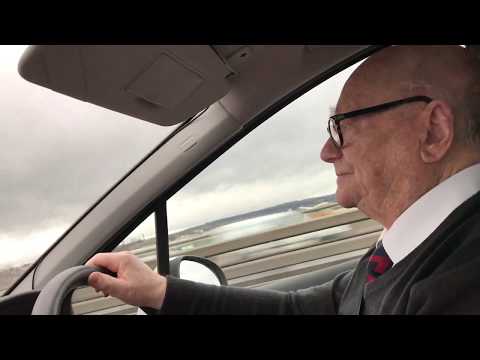
>> So how many veterans are in Scotland.
>> There are only two that are going to be there.
>> Two?
>> They had the meeting on the 29th, and I was informed that basically the following day that there'd only be two.
>> How many are there ...
>> How many is there in the branch?
>> Yes.
>> Oh, a lot more than two.
>> How many?
>> Probably about 20.
>> Twenty.
>> [INAUDIBLE] and the other Scottish unit members.
>> So many other units are there?
>> Up here?
>> Mm-hmm.
>> Actually, there's none.
>> Well, it's not ... It closed down, but they keep it going as a tea and coffee social.
>> So there's right now only about 20 Scottish Korean War veterans.
>> No, there's more, but a lot never joined anything, never made any effort. You'll meet one hopefully tomorrow morning. He's from Govan, and he phoned me [INAUDIBLE] Canada that contact me, and some of his workmates in the army have moved to Canada, but they kept in touch, so they told them to contact me, and he did. He phoned me and explained the situation, so I explained it to me, so Govan is about 20, 25 miles from here, and the ... We'll be pressed a bit for time tomorrow. We could take you to Govan and other places and get you back to [INAUDIBLE], so ...
>> I know that I organized the event July 27th to commemorate it.
>> I know. Yes, I know. Korea Day.
>> But I do it on Saturday before because no one can come then if it's on the weekday, but you do it on a Sunday?
>> The nearest Sunday to the 27th.
>> Yes, I do a nearest Saturday.
>> Aye, well, the reason for that is on Sunday, well, it's a day of rest.
>> Yes.
>> So the roads are a lot quieter, and then people my age, we're older, and so a lot of them can't drive themselves. They're disabled, so it's family. We drive them, so the drive up to [INAUDIBLE] on Sunday.
>> How many gather?
>> What?
>> How many gather?
>> Oh, it can be 100, 150, something like that.
>> Oh, wow.
>> Can be that.
>> But they're not all veterans, right?
>> No, there's the relative and associates, things like that, but it's a nice gathering. We have a nice service.
>> The one in Bathgate, the memorial in Bathgate?
>> They have that in Bathgate every year, and I think ...
>> So July, to commemorate July 27th.
>> I've been ...
>> What is it called here?
>> Pardon?
>> What is it called here? Is there a name for the day?
>> Is there a name for ...
>> The day.
>> No, no.
>> Because now in America, we call it the National Korean War Armistice.
>> No, there's nothing like that here at all.
>> So only the Korean War veterans know what it is.
>> The government, newspapers, they want to know it at all.
>> Okay.
>> They ignore it.
>> So nobody from the government.
>> Oh, the government hopes we're all dying off. They hope we die soon. They're annoyed. One of my friends is in the Lords in London in the houses, the House of the Lords, Earl Slim, John Slim, and John I've never heard of him speaking. He never speaks. He just goes there, collects his money in the bank, and that's it. You've heard offer.
>> You've heard of Earl Slim. Have you?
>> No.
>> Earl Slim of Burma, who commanded the British forces in Burma during the war.
>> During the Korean War?
>> No, at the 1945 one.
>> Oh.
>> And they made him an earl, who is a general, and they kicked him up to be an ...
>> When did you serve in the Korean War?
>> 1953.
>> Oh, towards the end.
>> Yes.
>> The last 6 months.
>> Oh, before the war? I mean, before the armistice?
>> Yes. Oh, yeah. I'm a veteran.
>> So you were there when the armistice ...
>> Oh, yes. I was in the [INAUDIBLE] in the last battle of the Hook, the battle of 355.
>> Kumsong?
>> The last battle of the Hook.
>> A lot of people have been talking about the Hook. Can you explain that?
>> Yes, it was a piece of ground, shall we say, in the valley shaped like a hook. It stuck out into the valley, but it prevented the Chinese passing and the North Koreans from passing, and they wanted it very badly. They commanded that area, and they wanted it, so they always attacked it in force, and they always get beaten off with an effort.
>> What was your assignment?
>> I was a driver. I drove trucks.
>> Wow.
>> I was also signalman.
>> Oh, so was Grandpa Hoy.
>> And I was also a gunner.
>> What? They made you do all of that?
>> I didn't do all of that in Korea though, but that's what I was qualified for. I volunteered. I was in the regiment fairly early, regiment, the Royal Horse Artillery, the third regiment, the oldest third regiment [INAUDIBLE] in the British Army. It was raised in India.
>> You were raised in India?
>> No, the regiment was raised in India.
>> Oh, the regiment.
>> Yes. Oh, way back in the times of the Indian uprising and all that, and it was taken over by British government originally and incorporated into the Indian Army and then into Britain. My great grandfather was a general in the Indian Army.
>> Oh, in the Indian Army? Wow, what year?
>> Pardon?
>> What year? When?
>> Oh, in 1800s.
>> Wow.
>> Yeah. He was a friend of Queen Victoria.
>> Wow.
>> Yeah. She liked him very much, and ...
>> What his name?
>> General Sir William Riley.
>> Wow, the Indian Army.
>> Yeah.
>> I know the Indians ... Because the 68th Parachute Ambulance.
>> Yes.
>> Right, is that right?
>> Yep, yeah, yep.
>> Correct, 68th.
>> They were there.
>> Do you remember them?
>> Yes, yep. They stuck needles in me from time to time.
>> The medics?
>> Yes, yeah.
>> So explain the armistice and the battle and just right before the armistice and after because you stayed until when?
>> I was there [INAUDIBLE] in November. Well, we set sail Christmas Day in the Indian Ocean. That was December.
>> December, 2000 ... I mean 1953.
>> You were there for 1 year?
>> [INAUDIBLE].
>> But you saw the ... That must have been so interesting. You saw the height of the war and the largest scale battle, right, right before. I don't understand. I heard that the armistice was signed, but they thought that they would negotiate a peace treaty soon after, right?
>> The peace treaty never ever took place ...
>> I know but ...
>> ... just a cease fire, an armistice.
>> But they were going to negotiate it, no?
>> No, they wanted to replace it soon.
>> Maybe the American government wanted to do that, but certainly the Chinese didn't want it, the North Koreans. No. There is actually ... There is so much been written about the Korean War.
>> You said so much?
>> Which does not get any publicity in Britain. As I've said to you, British government would rather we all die. A lot of our members got or was exposed German warfare. I don't know if you know that, but the government [INAUDIBLE], and probably that is the reason why most of our casualties are all dying off with cancer. Yes. The incidents of cancer in the Korean War veterans is higher than in the general population.
>> Really?
>> Yep.
>> What kind of cancer?
>> Every kind.
>> Really? Because I know in Vietnam because of Agent Orange ...
>> Oh, yes, Agent Orange.
>> ... that a lot of Vietnam war veterans have cancer, but I've never heard of Korean War veterans having cancer.
>> Oh, yes.
>> In Australia, Canada and America and New Zealand, if I remember correctly, they all acknowledge it. The British government will not acknowledge it. There was a British woman whose husband died, and she had heard about the Australian people making compensation, so she started a case up, and she won. Took a while, but she did win compensation, but they never agreed that it was caused by the Korean War. You can imagine if everybody had cancer started claiming. What kind of money would be we be talking? It'd run into millions.
>> I wonder what about the Korean War caused cancer.
>> You need to ask the American government. When you go to Australia ... You'll be going to Australia, won't you?
>> Yes.
>> You must contact Haning Spicer.
>> Okay.
>> Have you got the name? Haning Spicer. He's gone all over Australia which has [INAUDIBLE], and that's because of his service for the veterans [INAUDIBLE] but ask Haning about it. He'll tell you a bit more, so the consequence, I reckon, of it, and when I was in Canada, one of the men who became an officer was talking about it with an American general there, and they were [INAUDIBLE] was cleaning his boot with it, and I wandered over to see what it was about and saw them [INAUDIBLE] screws, and they said, "Yeah, we know, but the sides are all wood, and that's why we're going to construct some metal, and we're thumping it in with a hammer," so that was introduction, and we became friends, actually, and he said to me, he says, "Arnold, [INAUDIBLE]." I said, "Yeah. I've got tons of it. How much do you want?" He says, "How much can you get me?" I said, "What do you want?" He said, "I've got [INAUDIBLE] war, and I've got no ammunition for it?"
>> Do you keep in touch with him?
>> Oh, yeah. I still keep in touch with him.
>> Oh, wow, and still lives in Nebraska?
>> Yes, Central City.
>> Why is the memorial here in Bathgate?
>> Well, it was built or organized and paid for and built by the Bathgate branch. It was a much bigger branch then than it is now, so no government money was ever applied to any memorial, although the defunct organization, the BKVA, when they quit, closed, they gave £1,000 to help refurbish it.
>> Oh, when was it built?
>> Pardon?
>> When was it built?
>> Oh, I don't know exactly. It was some time ago, a few years ago anyway. Yep.
>> Like in the 2,000s, like in the 1990s, '80s?
>> Yeah, yeah, yeah. I would probably say late '90s, early 2, but up on MacKenzie up here will be able to tell you all that. You'll have a difficulty in stopping him telling you actually.
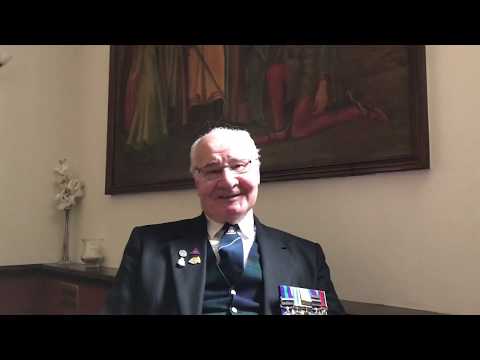
>> I am Adam McKenzie. I'm a member of the Bathgate branch of the Korean Veterans Association. I served in Korea from 1950 to 1951. I was stationed in Hong Kong when we were first told we were going to Korea. Nobody knew where Korea was. We boarded a Royal Navy ship and 4 days later arrived in Pusan. At that time, the Korean Army and the American Army were the only United Nation troops present in Korea, and they were [Indistinct] in a river called the Nakdong. We were moved up to there, and the Royal ... the Middlesex regiment and the Third Australian regiment, who were joined us just days later, crossed the Nakdong and made the breakout from it. That is why we have the only medal for the defense of the Nakdong. That medal, there was under 3,000 people entitled to wear it. It was the Middlesex regiment, the Third Australians and the Argylls. There is under 100 of us left today. After the breakout in Nakdong, we progressed up through South Korea and though we were probably 30 miles inside North Korea when the powers that be stopped us and ordered us to be dumped in 38th parallel.. During that time, the Chinese Army came in, and because we were on withdrawal, instead of the attack, we got pushed frankly back to where we started again. However, we started to regain country again, until we handed over to the King's Own Scottish Borderers in June 1951. We then returned to Hong Kong. [INAUDIBLE] got into any episodes that happened during then.
>> [INAUDIBLE] you went in with no winter clothing.
>> We had no winter coats. We had no winter clothing. We left Hong Kong thinking Korea was a tropical country, which it is during the summer, but not during the winter. We had no ordnance supply whatsoever. We were fed by the Americans. For clothing, bedding, etcetera, we begged, borrowed or stole off the Americans and the Third Australians. And we managed to live that way for a year. The Americans fed us. The only thing we had supplied from the British government was ammunition, nothing else. And we managed to survive for a year, and we were one of the only regiments that never lost a man with frostbite, although we had American dikes crossing the river which was frozen solid. Our vehicles sometimes were frozen in the morning when you tried to move them, etcetera, but we survived. Now basically, there's various episodes we could talk about. Like, Sariwon is one. We arrived at a town called Sariwon at approximately 3 o'clock in the afternoon. We asked for American tank support to take the town. The Americans said, "No, it's too late. Our tanks will be coming into town in the darkness, and we'll lose them." So we went into Sariwon without the tanks and took the town. The Third Australian then marched through us and took up a defensive position in front of Sariwon. We returned to the other side there and met the North Koreans and the Chinese coming in on the back wood. Because we were facing the wrong direction and we never wore steels helmets or anything, we wore a scarf tied up on our heads, they mistook us for Russians. And we back marched them, came round the back, contacted the Third Australian Regiment. We turned to face the opposite direction. We came in behind, and we took over 3,000 prisoners without firing a round of ammunition, nice. A very big problem for us was on the 23rd of September, 1950. On the 22nd, we took over a hill called 282 from the Americans who had been sitting on the hill for approximately a week and couldn't move off it. We took it over the 22nd, and on the 23rd, we put an attack in. Because the maps, etcetera, were so out-of-date and inaccurate, we didn't realize the next feature overlooked it. We took Hill 282, realized we're in a position where the enemy could look down on us and fire down on us, so we called for air support. Now air support was supplied by the Americans. We were supposed to put things out as air recognition panels. They were red, yellow and blue, and you put them out each day in a different design on the reverse of the hill. We did this. The Americans because they'd been dropping everything for 7 days on the one feature, came straight in and dropped the same load. The only problem was we were underneath it. We lost nothing, not one. Major Muir, who was our second-in-command, won Victoria Cross. It's a day we will never forget.
>> Why is there a Korean War Memorial in Bathgate?
>> Why is the memorial in Bathgate? Well I'm going back 20-something-odd years, and we decided we would do something, and at that time, I was the area rep. I covered the three branches that was in Scotland: the Northern Branch of Inverness, the Perth Branch and the Bathgate Branch. And I went to Birmingham for an executive meeting, and you had to put your propositions in 21 days before you attended. To me this was foolhardy because it gave the executive committee time to contact all the members, discuss it and make up their mind what we're going to do. Now there was only 13 area reps, but there was 22 executive members sat on the table, so if they disagree with you, you could be outvoted without any problem. I went down, and the proposition I put in that we were going to build a memorial was read out, and the chairman General Gadd, told me I was mad. I would never get it off the ground. All it done was reinforced us. I came back here, and I told all three branches that I was wasting my time and their money because it was pointless of me to go to Birmingham to the meetings, and that I resigned as area rep. We then we got together and contacted all the local councils, etcetera. We done collections, etcetera, and eventually we built our first memorial. In hindsight, we done it wrong. We didn't have sufficient capital to build what we wanted. However, we decided to go ahead with it, and we built it. And after we built it, we realized it wasn't really what we wanted. So we carried on, and we collected more money and funds, and almost 4 years ago, we knocked down the old memorial and rebuilt a brand-new one. Now since we built this new memorial, and [INAUDIBLE] put us down to one man, we brought a roofer all the way from Korea to put the roof on our memorial. All the tiles, etcetera, on it came from Korea. This man came and spent 1 week. The roof weighs over 4 tons. There is not one nail, one drop of cement in the whole building of that roof. And I think, by what I've heard since, he must obviously have spoke to people back in Korea after he returned there because we are getting feedback from the people in Korea who ... Yeah. That's basically ...
>> That's amazing.
>> You remember his name?
>> Who?
>> The Korean workman.
>> No. No. No. What we done, we brought him here, and we found a family in Edinburgh who run a Korean ...
>> [INAUDIBLE]?
>> No, Korean restaurant, and they lived in Edinburgh. And what we done, we picked him up in the morning, brought him out to site, picked him up and night and took him back again. And it just so happens that one of our members was married to a Korean, and she used to come out and do an interpreter to pass on information to him. Because ... You possibly don't know this, but we've got the Korean Presbyterian Church coming here on the 28th of June. Now he was obviously a church member because that was the first thing he asked when we picked him up from the airport, where could he find a Korean church, as it was Sunday and he normally went to church on a Sunday. So we think he has passed the information on after he's done it.
>> Explain what you're holding in your hand.
>> I am holding this ...
>> Show it to us.
>> ... It has two names. It has two names. It's known as a Syngman Rhee Medal or the Nakdong Medal. It was issued to the troops who done the defense of the Nakdong in June 1950, when the whole lot was really pushed out and the country was actually in a point of being overrun. We couldn't wear this because we didn't have a British medal to counterbalance it when it was issued to us. The only way we could wear it is on the right-hand side here, which very few ever do. We keep it like this and we still have. Not for the complete time, but for 2,000 or not 3,000, the Middlesex Regiment, the third Australian Regiment and the Argylls were the only troops ever to be issued with it and the only troops entitled to wear it. That was under 2,000 or 3,000. There is less than 100 of us actually left now.
>> How many died out of the 3,000? How many died out of the 3,000? What were the casualties of Scottish veterans?
>> I have no idea. I have no idea of the total. I know what the total was for the British people for the complete time, but for sure not 3,000, not unless you pay [INAUDIBLE]. A very good friend of mine was in front of me the night we crossed, and what we done to break out the Nakdong, we had an officer who was a very good swimmer, and he swam the Nakdong at nighttime and took ropes across it, and we built a bridge. It was approximately 18 inches to 2 feet wide, and we walked across that one night. Got in everything we required with us. The man in front of me got hit by an SB gun shell or shrapnel from a shell and fell on the bridge in front of me. There I had two options: I could either pass my weapon to the man behind me and pick him up or push him into the river so as I could get off the bridge along with the other people behind us. We picked him up. He's still alive today, but nobody knew about this until many, many years later, in fact at his 70th birthday party, when he admitted he wouldn't be here except for what happened that night.
>> What's that?
>> What is that? That is my cap. That is the cap of the Argyll and Sutherland Highlanders. It is the largest badge in the British Army, and the only badge with Victoria Cross in it, which was way back long, long before even our time.
>> Have you been back to Korea?
>> Yes. I've done a revisit to Korea and was very surprised. Disappointed in one or two things, but surprised, basically because when I left Korea, Korea was in ruins. There was hardly a tarmac road in it. There was no bridges across the rivers, etcetera. Now there's so many roads and so many bridges, etcetera, they've even changed the name of the town. Where I landed was Pusan. Now it's called Busan. I've done a revisit. I done the [INAUDIBLE] at the memorial ... at the garden house ... the cemetery at Busan and also visited the car factory, and I actually drive one of their cars now. I can't go back because I can't get travel insurance because age ... I'm almost 90 years of age. Insurance companies just won't insure you any longer. So I'm the same as a lot of them who are getting too old, and insurance companies, etcetera, don't worry with us.
>> Well, what do you think about the armistice between the two Koreas? The war never ended.
>> The war will never end in Korea. I've seen an article, quite recently in fact. I can't remember who wrote it, etcetera, and they reckon they will see North and South Korea united and becoming one country again. I do not believe this will ever happen. There is too big a gulf between the cultures in North Korea and South Korea, but South Korea has problems. You have 15 million people who live in Seoul. They live in 15, 18-story buildings. There is no wildlife around the country, birds, etcetera. You don't see them. Where are they going to put population if it keeps increasing? They can't keep going up. They can't go out, so where are they going to go? Pusan is the same. Pusan has 10 million. It's multistory buildings. Where is the population going to go? I don't know. I'd agree you have prospered and have developed, but I think they're going to have to look at what they do to carry on your development within the country.
>> Any other words for people watching this?
>> Any ...
>> Other comments for people watching this?
>> No, no. I'd like to know, why is there no wildlife in the country? Even when we went right up to the 38th parallel, etcetera, [INAUDIBLE] the only birds you see is little fat ones that's so far fed and slow, they can't get off the ground to fly. Pigeons is the only bird that I saw the whole time I was in Korea. What I did do when I was in Korea, I don't know if you've ... Have you ever met a gentleman called Andrew Salmon? You have?
>> I've not met him, but I know of him.
>> I worked with him when he done his last book, "Scorched Earth, Black Snow." I worked with Andrew when he was over in this country and researching that book, and dug up various people for him to interview, etcetera, etcetera, etcetera. I met up with both him and his good lady when I ... on a visit back to Korea. He stopped being an author because I don't know what you're going to do with all this, after 65 years, if you tried this in a book, I think your number of books selling will be quite low. This is why Andrew gave up writing books, and I believe now he does his tour guide, taking people round about to where different battles were, like the Hook and some things.
>> He still writes a column for one of the newspapers.
>> Okay.
>> And then we said, "Well, we're not ready to go. We don't have a driver for the train." So we had to use of our own members to actually just drive the train to take us up to where the Nakdong was, where we could [INAUDIBLE]. They didn't even have a train driver. Quite honestly, the country was in ... We got told that within 24 hours we had left Hong Kong and boarded a Royal Navy ship for 4 days later we're in Korea. So we had a 5-day period in which we got in there. As you also know, the 21 countries took part, but we were the first United Nation troops ever to go into Korea because the Americans weren't classified as United because they had been there beforehand.
>> [INAUDIBLE].
>> ... supplied us with a platoon, 4-inch mortars. When they came to us they were under the influence and under the American way of working, and we changed them, and after they came to us for proper treatment, they didn't want to go back. They realized it. Our system was far better than their system, and they didn't want to go back to their own unit after about 3 months with us. I think that's Alan. Could you check?
>> I will do.
>> Did you go when it was unveiled?
>> I was there, yes, I was there. I was very friendly with the PA to the Ambassador. She's gone back. She's now back working in Korea, but Jin and I were very friendly and I went there, and she was here when I arrived that morning, and I go in and ...
>> So explain about the memorial there.
>> I don't think it ... quite honestly the memorial is not ... there's no names on it. All right. It's a bronze statue, but the equipment is American, and it's something that we never used.
>> The one in Bathgate, the Korean War Memorial, has names? The one in Bathgate? Bathgate Korean War Memorial has names?
>> Yes, 1,089 names on it, every name of every man. In fact when we built the first memorial, when we built our first memorial we were getting people coming and visiting us and saying, "I tipped in at your memorial. So-and-so is wrong. So-and-so is wrong. So-and-so is wrong." So there was 40 of us got together, and we decided we'd contact every regiment, every Royal Navy ship, every RAF station that had people in Korea and ask them to give us an up-to-date record from their point, rather than use the one which they got from the Ministry of Defense, which we used the first time. We found a Lieutenant Colonel [INAUDIBLE] in Scotland, various other things, etcetera now, and as far as I'm concerned, that is the most up-to-date and accurate record, if people go. Where we even got four news reporters who was filming. There's one thing on it we do know. There was a boy sailor who was killed, but because he was a boy, they cannot record them as a boy without British rules and regulations, so they made him a Naval Seaman. He was on the HMS Jamaica.
>> Oh, I didn't know that.
>> And he was a boy sailor and he was one of the very first killed. I'll point him out to you, but he's on the roll as a naval boy [INAUDIBLE], but we knew that was wrong.
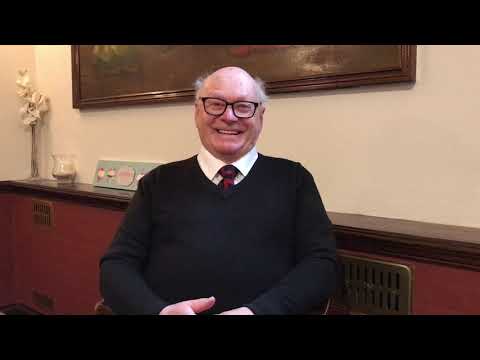
>> Good afternoon. My name is Arnold Corson Winery Shanthon. I'm a British Korean war veteran. I'm a member of a Reading branch of the British Korean War Veterans Association, the only association for Korean veterans in the country. I served in the Third Regiment of the Royal Horse Artillery, and I volunteered for Korea, and then I came to Korea, but I knew quite a bit about Korea to begin with, a bit of its history and its history involved with Russia, France, Britain and America, and that's gone back many years. In fact there was nearly wars over Korea in those days, and landed in Busan as we all normally did, and we got off the ship, greeted by an American band with beautiful shiny helmets and loaded onto a freight. Oh, dear. Oh, dear. Anyway, I took a long time from Busan up to, well, the ... this bussing area where everybody as sorted to where they would go or send to [INAUDIBLE], and I unloaded with all the rest, and I was a civilian mechanic through trade, so they sent me to Bentil Bridge [INAUDIBLE] of the [INAUDIBLE] of the 61st Light Regiment Royal Artillery. The trip comprised of four antiaircraft Bofors, and their detail was to guard in the event of another invasion of Bentil Bridge, and we controlled the road down to it. It was under our fire, and [INAUDIBLE] cable across the river. [INAUDIBLE], but the fighting was still pretty fierce, both at 355 and at the Hook. I was up. I drove a 3-ton lorry and very often a ration truck for the four areas, and up in those places quite often, and I was involved in a large part of the Hook and 355, primarily because of the truck carrying ammunition. I carried ammunition at the battle, at both battles, and that was it, and I remember in the Hook one in particular, there was two deaths from our units. There were lorries, and we had came back perhaps a couple of journeys, and we're loaded up with the ammo again, and we thought, "Well, we'll go in the van, drop the [INAUDIBLE]," and it started to get light, and we were having our tea when the WO came in and looking for volunteers to take ammo up to the front. Nobody said a word. I went out, and they came back in with a broad smile on his face and said, "Drivers of the two lorries, [INAUDIBLE]. I want them," so I had to step forward. He took us to his boarding, and he poured a lavish amount of rum into cups for us and bid us farewell, so we drove up, and when we approached the Hook, the road rose slightly and then dipped down slightly, and when we got to the top and went down. I've never seen anything like it in my life, and I never want to see anything like it ever again, the kind of eyes that were coming up full of dead and wounded. No. One funny thing about it is that one of our men from our unit, he drove a quad. A quad was a vehicle which made of basically thin of metal [INAUDIBLE] and the crew sat and saved this vehicle, and he had been given a trailer and had got it loaded with ammunition, and if I remember correctly, his name was Gunner Banyon. He must [INAUDIBLE] and carried straight on, and it landed in no-man's-land [INAUDIBLE] and he sat there all night. Everything quieted down, and when everything was quiet and daylight and the light started it up, back he came [INAUDIBLE] with this ammunition, and we did it [INAUDIBLE] so we took it back to the ammunition point, and [INAUDIBLE] because ammunition, so didn't want to do a thing, so eventually dumped it into the river. Perhaps, it's still lying there. Yeah. [INAUDIBLE] ammunition. Yes. I have had a little incident like most of us had. One of the funnier ones was the ... We were not supplied with any materials for building anything, no metal, no wood, nothing. We had to scrounge for it, and I sent out one day for a scrounging detail, and I went down. I went east, I should say. I didn't north, west or south. I went to the east. I'd never been that road before, and there was [INAUDIBLE] and I carried on along that road and on and on and on, and eventually, we came to an iron bridge, and we cut over the side of the bridge, and we were going to [INAUDIBLE] longest road when there was a convoy approached of American trucks loaded with men, and there was a one-star general's flag flying in the Jeep in the front. It was a major route, and the dust settled from the road was absolutely horrible, and you couldn't see through it, so you're only fumbling along and because there were about 6-foot ditches in both sides. Anyway, when we get through and the last truck had passed, and I'm driving in, and the Jeep came rolling up behind us with military policemen in it, and they stopped me, and military policeman says, "Where did you come from?" I said, "Well, I came from Bentil." "What?" "I came from Bentil. Why?" I said, "Well, the general wants to know, and he also wants to know have you seen anything untoward on your journey this way." I said, "No, no, nothing at all. I'm sorry. Why?" He said, "Well [INAUDIBLE] was captured last night again by the Chinese, and we want to take it back." I said, "Well, I've never seen a thing." I often wondered if they watched me get by and thought, "Nah, it's not worth shooting at," but yeah, lots of funny things, but when they ceased fire, we were sent up to 355 with the truck, and I had no idea what was going on. We knew there was a time when they ceased fire, but I had no idea about it, and I drove up to this particular [INAUDIBLE] still incoming and so forth going on, quite a bit of racket actually, and I drove in, and I get stopped by this officer, and he said, "Just sit there driver and wait until I'll tell you, and you'll switch on your lights." I said, "Are you nuts?" And he said, "Just do as you're told," so I sat there sitting, and some banging and crashing and all that was going on, and then it ceased, and he said, "Switch on your lights," and I switched on my lights, and they was finishing the flag pole, and they were lowering the flag, and that was [INAUDIBLE], and from then on, we started withdrawing all men and material from the front, and I was up one day, and there was an American, and I got pushed, and they're speaking to the chap, and I said, "Well, you're quite happy all once it's finished now," and I said, "[INAUDIBLE]." He says, "It's not you." I said, "What do you mean?" He said, "We lost a man last night." Yeah. "What do you mean you lost a man?" "Well, all we found was his rifle. We didn't find him." "Oh." "And he says but we never heard anything," so they were losing men well after the cease fire, and then that was not a long thing. Anyway, from then on, it was spit and polish I'm afraid, back to the old grind, and when I left, I was sent Gimpo on the back of an open truck in December. It was about four or five of us [INAUDIBLE] with a bottle of brandy, and we sat and enjoyed that bottle of brandy. I don't think it won't stop us freezing, but we got there. Korea, I enjoy quite a bit Korea. Actually, I knew about it when I was boy. I was an avid reader, and I read quite a bit about it, and that's why I said to you about the [INAUDIBLE] wars between Russia, France, Britain and America. At various times, each of these countries had the men and the leading jobs like Postmaster and things like that. There was always this fight to control the country, and I remember when reading [INAUDIBLE] American warship. It was a sailing ship, not steel vessels like now. It was old sailing ships with cannons. They're were cruising along, and they needed water, so they sent aboard the shore with drums and bottles to get fresh water, and the natives slaughtered them, and the captain of the ship is rather annoyed about that, so he opened up the gullies with his guns and slaughtered back. Not a nice story, is it? But the [INAUDIBLE], but the train from Busan. Yeah. It stopped and started. It stopped and started. I was up in the luggage rack sleeping. Well, I tried to sleep anyway, and somebody lost their weapon, dropped their rifle [INAUDIBLE]. I wouldn't have to go and pay for it. When I ... I've been out to Korea about five times. Etta Green and I were roommates twice, and the change is remarkable, remarkable, and the people speak to you, and they're so grateful. It becomes an embarrassment. One gets embarrassed, but they're so grateful, and they say it and show it, and it's came on in leaps and bounds, but I've always said to you, the population growth is unbelievable. When we were there, there was ... Eventually, there three, I think, bridges there, but now there's about 30 bridges, and yeah. Very industrial people. Some lovely places in Korea too, and if I could afford that, I would go and live there. Yeah. I think I would go and live there in the summer, not too keen on winter, but the [INAUDIBLE] I was there. We were fitted out with gear for it and all that, and yeah. You could live reasonably comfortable, reasonably. Yes. Anyway, if you have any questions to ask. I'm Scottish. It's always been mostly English-staffed unit, very few Scottish people. I could tell stories on the ship out where there were Scottish troops on it, but I'm not going to. No, sorry. No, and it didn't put us in a very good light actually. Continued fighting between them and English regiments, and when we got to Singapore, no, Hong Kong, we took a field regiment, an artillery field regiment unit, and then formed the warming parties if there was any more. They would have to swim to Korea. We used to make them, so things were very comfortable after that. I didn't have as much as a Scottish accent in those days, and when I came back from the army, I was decidedly more English spoken than Scottish. In fact, walking along the street in my hometown when a chap staggered out the public house, bumped into me, and he said to me, "What's the time?" I said, "Oh, the time is such and such, and he called me an unpleasant English person, suggested I return to whence I came and staggered off, and I stood on the pavement, and I laughed and laughed and laughed, and I thought it funny, so funny. What the ... My own life, I was brought up on a farm, and my stepfather is a farmer. He'd been a seaman in his younger days, and all his sons had been seamen as well, and then I went to sea, and I became an officer, and my wife didn't like it, didn't like going away from home too much, and my son is a commander, and he operated out of [INAUDIBLE]. He was a warfare officer [INAUDIBLE] at the time, but now he's staying with in the National ... What's his name? Oh, dear, now I forget it, but it is sort of the getting money here, there and everywhere sort of things to be done in different countries, different organizations. Millions are getting away. He quite likes it. Adam doesn't know him though. Eric is dead now. He died a couple of years ago actually, and we took four out, but we couldn't take the fifth one out. An excellent man, Eric. He was a nice chap. He was a member of this place, and by the way, there is no KVA. There is no KVA. There was at one time, and I was a member of it, but when the colonel took it upon himself to shut it down and did even though 75 percent of the living membership voted against it. He still shut it down, and we knew what was coming, so we readied an organization standing by to take over, and that became the British Korean War Veterans Association, and that was a legitimate, registered organization, and we continually pleaded with the Korean government to recognize us, but they still recognize the BKVA, which doesn't exist. It only exists in the memory of the units who refused to join the BKWVA. It's tea and biscuits, social gatherings. [INAUDIBLE] Adam says.
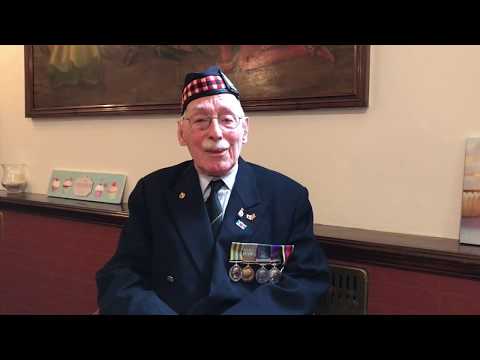
>> I am Alvin Cameron, and I served in Korea with the King's Own Scottish Borderers in 1951 and '52, and we arrived in Korea from Hong Kong where we'd been stationed before, and it was a bit of a shock because we had expected to have a leisurely disembarkation, but it was the start of the big Chinese drive down through Kapyong, and so we were suddenly told we had to be up at Kapyong the next morning. We arrived as I say and were driven to a rendezvous point and just bellied down on the ground that night. We all had a blanket with us and a greatcoat, and we just put that over us, and we woke up next morning with frost all over the greatcoat, which was a bit of a shock having just come from Hong Kong. And then the Argylls who we were taking over from came through and left, and we went up to Kapyong front and spent the next 3 days digging in and withdrawing, digging, withdraw, marching back about 7 or 8 miles each day. So it was a bit of a abrupt entry into the war, but we didn't actually have any contact at that time with the Chinese or the North Koreans. From there, we went into our reserve position and then moved to another position just north of Seoul where we did have contact to the battalion, but I ... At that time, we were a bit of a spare file in the battalion because I'd been second in command of A Company when we arrived, but when the Argylls left, they left someone who took over that position, and I had nothing special to do. So when our intelligence officer was injured in a traffic accident, I took over as intelligence officer for about 6 or 8 weeks. The battalion then moved from that position over to the Kansas Line just south of the Han River, and I then took over a platoon. We were in a defensive position there, and there were minefields all around, and I remember, on one occasion, a Korean man was coming down the road towards our position and walking along the embankment on the side, which I knew was mined, and all the jocks were shouting at him and waving, saying, "Get off onto the road," and he didn't, so he just kept on walking until he hit a mine, so I then had to go into the minefield to get him out, and our regimental aid post came up took him away in a stretcher jeep. Shortly after that, I was given a different job where I was training potential NCOs at the battle school about 15 miles behind the front line, and I did that, again, for about 8 weeks, during which the battalion had a very stiff battle when they crossed the Han and advanced up [INAUDIBLE] commando. I was then ... went back to battalion as second in command again of A Company, and in November, we had a big battle where a Chinese division attacked the battalion position, and it overran two of our companies, but my company was in reserve, and we were expected to do a counterattack, but that was canceled, so nothing really happened. And after that, I became a platoon commander again in A Company, and we pulled back to a shoulder on Hill 355, which was the big hill in center of the division's line, front line [INAUDIBLE]. And one night we were on there, I was going around my sentries at about 10 o'clock at night, and 14th Field Regiment Royal Artillery had been firing over us all day in support of the [INAUDIBLE] who were just on our right front. I suddenly realized, this latest salvo was sounding very close, and in fact, it came in and hit our position while I was walking along, and I received a wound in my chest and in my left arm, and the platoon sergeant and medical orderly who we had trained in the platoon gave me first aid, and then some volunteers carried me down the hill up the back about 1,000 yards, and I was taken off by a stretcher jeep and ended up in an American MASH, Mobile Advanced Surgical Hospital, 8055 MASH. I woke up just before I was operated on, and it was ... And I was amused later when the television series "M*A*S*H" was brought in to remember my experience, and it was exactly like it had been on the film. And I was evacuated from there. I went to [INAUDIBLE] where I spent ... That was on the 21st of November I was wounded and evacuated, and the snow and winter arrived on the 23rd because I remember a chap coming into the tent in the MASH, and he was covered in snow and stamping his feet, and I said, "Yeah, I timed that rather well," and I didn't manage to get back until early March when I rejoined the battalion, and again, I was a little bit surplus to the establishment. I was given a job digging a defensive position along the Kansas Line again as a reserve position for the division if it was needed, and again, two Korean peasant women were cutting the brush for firewood, and of course they did it in the minefield, so both of them got blown up, and again, myself and the sergeant who was with me, we had to crawl into this minefield very carefully and eventually drag these two women out and get them evacuated. After that, I became second in command of D Company, and I just used to go up ... I used to enjoy very much driving up. We'd go up late at night, at about 4 o'clock in the morning, to do our resupply of the front line, and we'd go to a [INAUDIBLE], and then a man packed with [INAUDIBLE] always took front line, about 1,000 yards. And on the way back, the dawn would be breaking, and I remember it was such a lovely sort of feeling driving back to the camp in the dawn in Korea, and I really did enjoy that immensely. And eventually in July of '52, I moved upward on to the advanced party of the battalion which was now due to return to Hong Kong, and I left Korea in July 1952. As you can see, I had ... Although I did spend a reasonable bit of time actually in the front line with platoons, I never had any contact with the enemy when I was doing it, so I enjoyed my time in Korea basically, had a couple of frights, but that was about it.
>> Have you been back to Korea?
>> Yes, I've been back twice since then.
>> What do you think?
>> The first time I went back was privately. I went with my wife when I retired from work, and I was really surprised to see how big Seoul had got and how well developed and everything else because my memory of Korea was that everybody was wearing white. All peasants were wearing white, and there were no trees virtually on any of the hills. They;d all been either burnt off or shelled off with napalm and stuff, and all the peasants collected the brush wood underneath it for firewood. So I was really surprised when we drove up to my old platoon position in Kansas Line to see trees all over the hills and everybody dressed in what I would now call normal Western dress. It was the thing that really impressed me. The next time I went back was on an official visit when I took one of my grandsons with me. That was in November 2013. I was really quite humbled by the reception we were given and the way we were treated as such honored guests and how everywhere we went, talking to the ordinary people, as soon as they knew we were veterans returning, they all shook our hands and said, "Thank you. Thank you," and it was a very humbling experience, but I could understand why because, as stated, Seoul is only 30 miles from the border, and Koreans know what life is like on the other side of that border. I think that's about all I have to say really. Any interest to you?
>> That's wonderful. I too am very grateful, and that's why I'm here. Thank you so much for your service. You're very correct. On the other side, north of the 30th parallel, they can't enjoy the freedom and prosperity that we enjoy.
>> No, I mean, they live a terrible life in the north, on the whole, don't they? Ordinary people at least do, yeah.
>> So hopefully in your lifetime there will be one Korea.
>> One does hope so, yeah. There were two little incidents which I'd like to mention. First of all, shortly after we arrived, we were given a company of Korean porters whose job it was to carry all the resupplies and ammunition and stuff up the hills so that the soldiers just did the fighting, shall we say. And at the presentation when they were brought to us, one of our majors, Alan Smythe, was in charge, but he turned to this little sergeant who was actually going to be the person physically in charge of the porters' platoons and said to him, "Okay. They're yours now," and this little sergeant walked forward about five paces and started screaming at the porters in a foreign language which we didn't understand, and all the Koreans shot to attention. And then he shouted something else, and all the section leaders came out and formed a line in front of him, and he then went down the line slapping each one on the face left and right. Of course, Major Smythe went absolutely berserk, saying, "What on earth are you doing?" He said, "I have just told them, sir, in Japanese that, during the Second World War, I was a prisoner of the Koreans up here, having been captured in Hong Kong, and that they were beastly to me then, and now I would be beastly to them if they didn't behave and do what I said." And we all thought, "What a chap." He had been 2 years in Korea with just a jersey and trousers even through the winter, so he was, shall we say, a bit bitter about Koreans. But the [INAUDIBLE] I was saying, when we were at the Kansas Line where I rescued the two women from the minefield, one of the porters there, although they were civilians, they were subject to military law, and this chap had been absent or something like that and had been sentenced to two strokes of the cane every 2 hours, and every 2 hours, an officer or NCO would come along with a whipping cane. He would bend over, take his trousers down and get two strokes with a cane on his backside, and we all thought, "God, how uncivilized can they be?" It was really weird. That's it.
>> Do you know why he was whipped?
>> No, he ... I think he'd been absent without leave, and literally every 2 hours, they'd come up, give him ... with a cane on his backside.
>> A Korean person?
>> Yep.
>> Interesting.
>> Yep.
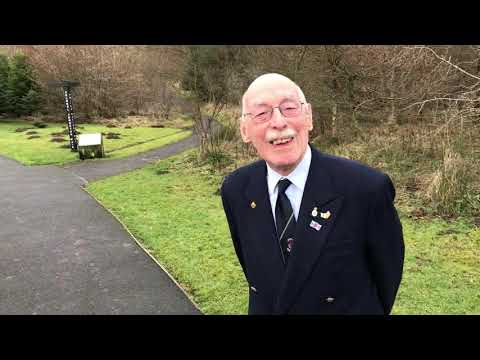
>> ... the two mounds, which the shrine is in the middle of ...
>> Okay.
>> ... are in the shape of the ying and yang.
>> Oh. Who designed it?
>> An architect in [INAUDIBLE]. The original one was done by a student here at Heriot-Watt University.
>> Mm-hmm.
>> But the new memorial was done by an architect [INAUDIBLE].
>> Hmm, yep, and we brought the ...
>> The fir.
>> We brought the tiler from ...
>> Korea.
>> ... Korea and 10 tons of tiles.
>> All these tiles came from Korea.
>> They're all genuine old tiles from Korea.
>> And the fir, the tree, the tree ...
>> The trees came over [INAUDIBLE].
>> And were grown ... They were grown for us at the Botanical Gardens ...
>> Botanic Gardens.
>> ... in Edinburgh. And then ...
>> Wow.
>> Then the second place [INAUDIBLE].
>> Shotts Prison.
>> Wow.
>> Yeah. Once they got too big for the ...
>> Botanic Gardens.
>> ... Botanic Gardens to hold them ...
>> We look for some place to grow them on because they were still in pots, and they went to one of the biggest prisons in Scotland.
>> Prison?
>> Prison, prison, and they grew them on for us.
>> Yes. Yeah. The architect originally wanted the green oak that the shrine is built of to be kept yellow with oil, but I actually wanted it to go gray like this so it would actually match with the tiles on the roof, and so that's why it's all now gray although ...
>> [INAUDIBLE] in the navy.
>> All thousand ... How many? Sixty-eight thousand seventy?
>> One thousand [INAUDIBLE].
>> These trees have been planned in memory of veterans of a branch who have since passed away, and we have a lot of plaques and each one a remembrance. That's our latest one we've [INAUDIBLE].
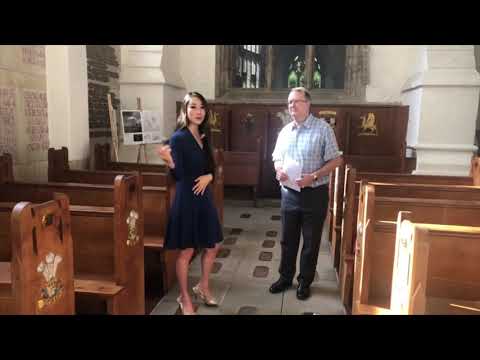
>> Hi, everybody, from inside the St. David's Chapel ...
>> Correct.
>> ... of the Llandaff Cathedral.
>> Correct.
>> Yes. I am here with Mr. John Kenyon, who is the archivist for the Cathedral, and I'm here to honor the 32 Welshmen who died during the Korean War. Yesterday, I met the veterans of the war and the regiment, and many of them knew a lot of them, and I just ... so again, they're not just names, but they are ... and we're.
>> Still remembered.
>> Yes, and someone's sons and friends, so I do come here and think of them. When was this built?
>> Well, it was dedicated in 1998, and the inscription is engraved by Yein Reece, who is based in West Wales. He's a superb calligrapher, carving lettering on the stone, and this is one of four examples we've got of Yein Reece's work, the most recent work that he's undertaken, so I hear this place, this entire place is dedicated to ... Oh, here it is, the Welsh, the Royal Welsh.
>> It was built after the devastation in the second World War when the cathedral was damaged by the war parachute mine.
>> Yes.
>> This new chapel was built linking the cathedral to the new offices [INAUDIBLE] regiment were inscribed by Mr. Cayon on the east wall there.
>> Yes, we'll take you to over there, where it says ... I mean, it lists all the conflicts, but I couldn't help but notice Korea right here. Korea, 1951 to '52, and while the war lasted until '53 and technically still at war, the Royal Welsh was involved in it.
>> In those years.
>> It was in those years. They suffered heavily, but I just loved how all the pew has the Welsh battalion, different battalions, the first, second, this.
>> [INAUDIBLE] Wales [INAUDIBLE] commemorative plaques of the colonels of the regiment, some generals, but known as colonels of the regiment, and that all is going back into the 1700s.
>> I do want say because I brought my brother, Jan, on ... Today is Wednesday, so on Monday, during the [INAUDIBLE] cheese and prayer for the Korean War veterans, so I was so happy, so thank you, Chris. You must have shared our feeling with her, so thank you so much, and we're going to show you inside the cathedral, and Mr. Kenyon is going to lead us to another place where it honors Korean War veterans.
>> That's right.
>> So we'll follow ...
>> Which way?
>> Either one.
>> We'll go this way.
>> When was this chapel built?
>> It was in the 1950s.
>> 1950.
>> '50s, yeah, all done by George Pace, who was the architect charged with restoration of the cathedral [INAUDIBLE].
>> It's such a hallowed place, and it couldn't be a better ending to my journey. Oh, wow, are those ...
>> Yes, these are all ...
>> ... original flags?
>> Yes, yep. They're just left there, and they're unconserved, so they'll slowly deteriorate until [INAUDIBLE] church grounds, so they're left unconserved.
>> So this church ...
>> And hanging here as well.
>> This church is how old?
>> The church as we see it, the earliest part of it is 1120s.
>> Wow.
>> But it was a church here long before that going back 1,000 years or so, but the building we got is 1120. The big arch we see ...
>> I'm in a place that is 900 years old, and I shared with Reverend Jan, but one of the veterans when we were reciting ... The citations of the Medal of Honor recipients, he said something that I will never forget, so look how beautiful this is, but he said as we were reciting ... Reading their citations, he said sounds travel all throughout the universe eternally, and as I was praying earlier, I felt I wanted to change that a little bit to fit this occasion, and I said also travels, and it remains in eternity as well, so think of all the prayers that were made in this hallowed place for 900 years.
>> This is the big arch [INAUDIBLE]. That's the earliest one, and then this piece is postwar [INAUDIBLE] similar one on the church's new [INAUDIBLE] to the 1500s.
>> Beautiful, so everyone, if you come to Cardiff, Wales, please, visit this cathedral. It is just absolutely beautiful.
>> So we're walking on the south aisle now.
>> And I have to say for ... I've never visited a cathedral that honored veterans. Some people think veterans, war, but as the reverend prayed, they defended peace.
>> You'll find [INAUDIBLE] earliest thing. This stone is even earlier. This is probably about the year 1,000. It's known as the only the Christian monument. It's part of a cross.
>> Year 1,000?
>> Yeah, about year 1,000.
>> Wow, and [INAUDIBLE] because even one death is precious and far too many. There is ... You can see right here, Mr. Seaton killed in Korea, and you think that he was ...
>> He was a member of the Old Llandavian, so the Cathedral School. I don't remember whether a member [INAUDIBLE] but he was an old boy, but he wasn't serving in a Welsh regiment. Otherwise, he would have been commemorated in the David Chapel, so he must have been serving somewhere else in the British Army in a different regiment.
>> So again ...
>> So those are the two main areas, David Chapel and this memorial here.
>> So again, everyone this is the Llandaff Cathedral in Cardaff Wales and the last stop in my 10-day journey across both Ireland and Wales to honor veterans and promote peace. I thank you for joining me on this journey. It has been extremely humbling and gratifying. Like I said, yesterday, one of the veterans told me that it was his first time in almost 70 years somebody in-person thanked him for his service in Korea, and that really devastated. I think we cannot say thank you enough to our veterans, so please, if you see a veteran, go and say thank you. It really does brighten their day and make everything worth it.
>> And thank you for your visit as well.
>> Oh, thank you.
>> It's been a pleasure to welcome you to the cathedral.
>> Thank you, so bye-bye, everybody.
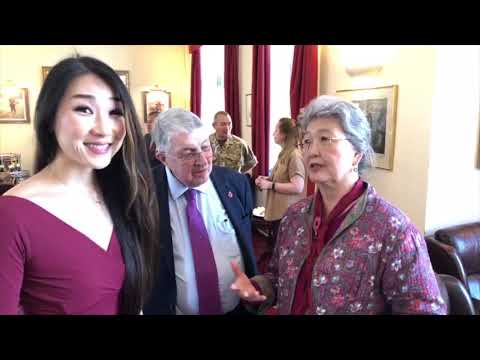
>> Hello, everybody, from inside the Maindy Barracks. I'm in Wales, so you can see the Welsh Regiment flag over there alongside the UK, so you can show, yep. Well, I am going to take you inside the officer mess hall inside. You can zoom out. So here's the picture. It looks pretty old, but I've just finished interviewing at least nine of the Korean War veterans. There are 12 here. Where's Grandpa Brent? Okay. Yay. Grandpa Brent said something that really ...
>> Can I get through?
>> Oh, of course ... that really ached my heart because he said ... What did you say?
>> I said, "Thank you very much. You're the first person to say, 'Thank you.'" I've got it in print. I've got it here. You're the first person to say, "Thank you for your service."
>> Everyone, as a young person, that breaks my heart, so let's please, please, please make a note to, when you see a veteran, right, thank them because it means a lot to you.
>> It means a lot.
>> Yes, and it means a lot for me to meet you, and I was so happy because I really, I was hoping and praying for one, and God showered me with 12. Thank you.
[ Chatter ]
>> ... for 62 years.
>> Aw!
>> They never liked it.
>> And thank you. Muah. I'm also very proud to say, the daffodil pin because, well, daffodils are the national symbol.
>> And that's social in the club, I tell you.
>> So I'm very happy, and some of them, I gave this heart, okay, so, yay, and look at his tie, "Korean veteran." So I'll show you inside as well. Thank you so much also for your interview.
[ Chatter ]
>> We just had lunch. Oh, you have to say, "Hello."
>> Yeah, we said, "Hello," earlier, not again.
>> He was so articulate. I thought he was a professional broadcaster. He was so good with this interview, so thank you so much, and you brought a lot of pictures. You just brought so many pictures.
>> If I could get the [INAUDIBLE], would you let me?
>> Of course. Oh. I'll write you one later, okay? Okay. I wanted to also just introduce two last people. My friend Paul Song's aunt who actually lived through the Korean War, she drove with her husband from Bristol. So say, "Hello."
>> Hi.
>> What does it mean for you to meet some of the veterans who ...
>> They're all in their late eighties, and so it is quite moving to listen to their stories, and also, I think it's amazing that you, as a young lady, are inspired by his work because ...
>> Here, here.
>> ... your generation forgot about the war, but this reminds everything. It's just amazing. I find it so touching.
>> How old are you during the war?
>> Eight or 9.
>> Wow.
>> Wow, so you must remember though.
>> Yes, I do.
>> She was in Pusan.
>> Yeah, I was a refugee.
>> Well, that is another reason why all of us literally are here because they sacrificed, and so I wanted to introduce you, last but not least, to Lieutenant Colonel Chris Kilmister, and who with many of his, of course, colleagues, but he mainly organized this entire ceremony event.
>> My pleasure.
>> And thank you so much, all of you. I was amazed, really.
>> Pleasure, no, pleasure.
>> Yes. Can you say just something about the Royal Welsh Regiment that you can boast about?
>> Well, we're an amalgam of quite a few older regiments, South Wales Borderers, the Welsh Regiment, the Royal Welch Fusiliers, and now we're the Royal Welsh, and people you see today are some of the comrades from those antecedent regiments, and we look after all of those, and we're very proud of them.
>> What would you say even within the regiment? Because you fought in so many different wars. Maybe the Korean War is still the lesser-known of the different conflicts.
>> Not in our regiment because the Welsh Regiment fought there. If we hadn't fought there, then we probably wouldn't know much about it, but because they did fight there, we do know something about it, and we've got many of our comrades over the years who told us the stories. We've also got a very good book, which one of our officers wrote about his experiences in Korea, which is a reading book for most young officers.
>> I'm happy to hear that. Do you think the general public, the Welsh public know about the Korean War?
>> I suspect not.
>> Oh, that's a bit unfortunate, and I guess, in a way, that's what I'm also trying to do. I'm trying to preserve the stories so that my generation and the younger generations will be a little bit more interested and educated about their sacrifices. So thank you so much again ...
>> Pleasure, no.
>> ... for organizing all of this. I am just overwhelmed with the hospitality, the generous reception welcoming, and I won't forget them, and I hope they don't forget me either.
>> No, I'm sure they won't.
>> Thank you. So, everyone, this was my last country, last place after now 30 countries to honor veterans around the world as well as all 50 states in America, and it has been one of or the greatest, I know, fulfillment, I think, in my life, and it gets very addicting, everybody. You meet one, and you want to meet another. You want to go to another because you want to convey that same love and gratitude to everybody. So thank you for joining me on this journey, and I will visit the cathedral again tomorrow before I fly out. So thank you, everybody, and let's keep honoring veterans and promoting peace. Bye.
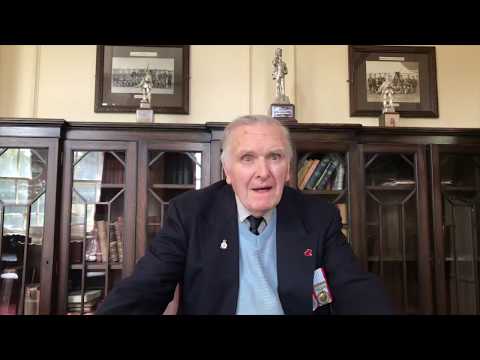
>> My name is [INAUDIBLE] Jones, 24th [INAUDIBLE]. I was born in 1933. I lost my friend in Korea. I was very lucky myself. It was the Hook, it was, and I was transferred to 29 Brigade, so I didn't go in the Hook, and unfortunately he was killed with a mortar bomb. I tried to go and see his family, but I transferred my home. I was living up [INAUDIBLE] Wales, so I would've liked to go up to see him, see the family, but [INAUDIBLE] but it's really awkward if you got transferred on your own, and it's [INAUDIBLE] or famine and all that way. Yes.
>> Hmm.
>> So I would've ... he must probably ... he got ... Well, I'm thinking they couldn't have relatives there. No, but it's a lot of ... as time has gone now. Yes. Yeah.
>> What do you remember about ... You were part of the Welsh Regiment, right?
>> No, no, I was with the Duke of Wellington Regiment.
>> But you're Welsh?
>> Yeah. No, that's Yorkshire. What it was, I was an officer in service, and the battalion ... The Welsh Regiment was pulling out when I was going into Korea, and then this battalion then, the First Battalion, the Duke of Wellington's, was coming from Minden in Germany, so being an officer in service, it was put in there because they was understrength. Battalion was understrength.
>> Mm.
>> So I ...
>> But you're ethnically Welsh?
>> Pardon?
>> But your background, you're Welsh?
>> Yes, oh, yeah. Mm.
>> Mm. And you said the friend that died ...
>> Yes.
>> ... was ...
>> He was from ...
>> He was Welsh, too?
>> Welsh, oh, yes.
>> Was he one of the fallen?
>> Pardon?
>> Is he one of the 32?
>> Jones, same as mine, looking for Jones, private he was.
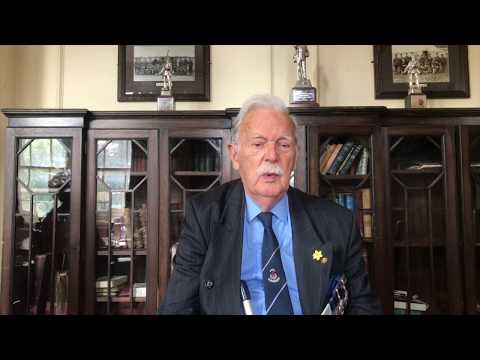
>> My name is David Sothers. I'm a colonel in the Royal Engineers. I'm 88 years old, and I went to Korea in 1952 and came back in 1954. I worked on the docks in Busan and Incheon and K-9 and looked after all the ammunition that went out to the front and all the food and everything, and we had two harbor masters in Busan. I was one of them, and we looked after all the shipping and the railways, and we flew to Incheon to deal with the vessels up there, and I came out in 1954. I recalled to the army in 1956 for the Suez landings, and I then was with 3rd Armored Division, and I retired [INAUDIBLE] colonel a few years ago.
>> Wow, so how many years did you serve in the ...
>> Full-time? My full-time service was 2 years national service and 6 months in Egypt in the Egyptian landings, so in total ...
>> Yeah. I was in the Territorial Army for 40 years.
>> Wow. Well, thank you for your service, but what do you remember about the Korean War?
>> The children didn't have any food, and we used to feed some of them, and sometimes the ladies working for us had babies when we were working, and we looked after them, and the people had a very bad time.
>> You know, I have to say, a lot of the veterans, they all tell me children and that ... How much it left an impression, and if I'm correct, the British Korean War Veterans Association even supported an orphanage.
>> Yeah. That's right and a scholarship, yeah.
>> Yes, and a scholarship until pretty recently or even maybe until now, but yes.
>> Yep. We have students from UK to go over to Korea to study for a year or 2 years.
>> That's really amazing.
>> Yeah.
>> Well, I do want you to know that the Korea today you see is ... has been able to rise from the ashes of war thanks to your contributions, so thank you.
>> Yeah. I went back when the Queen made a state visit. She took 30 of us, and we went back to Korea for 2 weeks, and we went around, the Queen.
>> With the Queen.
>> And we had a ... We were looked after. We all got medals and met the president and things.
>> Wow. When was this?
>> Ten years ago, I can't remember, when the Queen went.
>> Wow, and how are you selected? How did they select the 30? That's a great honor.
>> It came down from above.
>> Well, you must have been very special.
>> No, no, no, no. Just lucky.
>> No, there's no such thing as luck, God's way.
>> Okay.
>> Thank you.
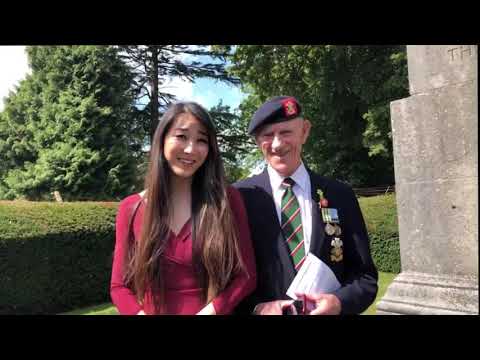
>> Hello, everybody, from Cardaff, Wales. Guess who I am with, with 12 of my Welsh grandpas. Everybody say, hello.
>> Hey.
>> Hello.
>> I am very honored that 12. I was praying for one. I got all these doubles and quadruples of my prayers, and 12 of them were here. I want to hear stories from six of them. Half of them already, we're going to interview six of them more, but if we can show you, we laid a wreath or four wreaths, we're going to show right here, grandpa. See? There's four wreaths that we laid in honor of the Welsh regiment who fought in Korea from 1950 to 1952 up there, and I think ... Can you read this for us? This was very poignant, the last post, the Kohima prayer.
>> Want me to read that?
>> Yes. Can you read it very loud because it was so moving.
>> "When you go home, tell them of us and say, 'For your tomorrow, we gave our today.'"
>> And not one of them is forgotten, so, everybody, I want to show you and brag about my grandpas here. They've been so generous with their time. I beamed. I screamed, literally, as I walked in because I was so happy to see them. Many of them brought photos. His wife, Gloria, even brought me a Welsh doll, so please thank her for me, but again, I thank God for this beautiful weather, and we're going to head off to have lunch and continue to interview, so I will show you more of them later, but I just wanted to show, and we're going to loop around so I can show. Yes. So again, thank you all for following me. This was my last visit, but I will see more of you in there as well, so thank you again from Cardaff, Wales. Bye.
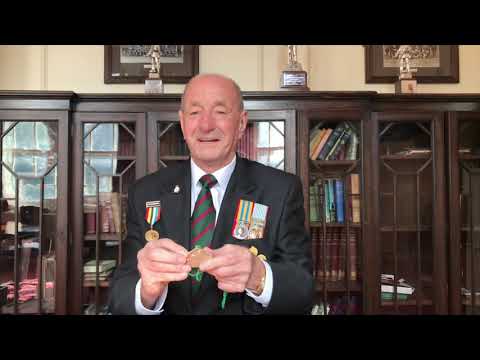
>> Right, my name is Emmett Smith. My date of birth is the 21st of August, 1933. At the age of 18, I joined the Welsh Regiment in Cardiff. This is the barracks I joined at. I went to Hong Kong to ship me to Korea, but while in Hong Kong, I was transferred to the King's Regiment, King's Liverpool, and I went into Korea in September, 1952, and on April the 13th, I was killed in Korea. There's a story behind that. I was blown up with mines. It was in an attack, and we were blown up with mines. Anyway, I went into hospital, and I always wrote home every week. I wrote to my mother that I have twisted my knee, so I've got to go into a hospital, but I had shrapnel went straight through my thigh, and the surgeon come to my bed, and he said, "I'm going to take your leg off," so I said, "If that's what you got to do, sir, you've got to do it," and they had an operation then. They'd quoted 11 in the morning, and I came to at 10 past 5, and he come to my bed, and he said, "I saved it by 1/8 of an inch," so the shrapnel, as I say, went straight through my leg. Have you ever seen shrapnel? No, I've got a piece of shrapnel. That's a piece of shrapnel, and this is not the one that went through my leg, but this is one that I was in the trench and a bomb come in and landed within 2 feet of me, and the trains collapsed, and I was buried in the trench, so I got a little piece of shrapnel [INAUDIBLE], and that's my story, but I'm not dead. I assure you, but I wrote him, as I said, to say that I had injured my knee. At the same time, my mother [INAUDIBLE] I was dead, but what had happened, they'd mixed the reports up. The ones who got killed, they told them they wrote injured, and the ones that were injured, they said they were dead.
>> Wow.
>> And I was there until the end of the war, which was in 27th. It was July, as I said, and on the 28th of July, [INAUDIBLE] there, the Chinese, and they was calling us down, so off the hill. It was no-man's-land, and he was handing me with that, if you can see. It says, "Life exists once for all value and love it," and that is from the Chinese volunteers in 1953.
>> That's the original?
>> He hung it around my neck.
>> That's the original?
>> Yes, yes, yes.
>> Wow.
>> "Life exists once for all value and love it."
>> Wow. So you remember July 27th well?
>> Yes, yes.
>> What were you doing?
>> [INAUDIBLE] the night before. The Armistice was signed at 10 o'clock in the morning, but it didn't come until 10 o'clock. It had to be 12 hours, so everyone knew before it began, so I was on patrol that night, and at 10 past 10, we asked over our radio, "Can we come back now the war is over?" and the North Koreans answered, and they said, "All over and out. Go home," but talking about North Koreans and Chinese, the Chinese again, I was on the patrol Christmas Eve [INAUDIBLE] 3 foot of snow [INAUDIBLE] he come on, "What are you boys doing here on Christmas Eve? Why aren't you at home with your wife or girlfriend [Indistinct] fire. Come to think of it, who is on the [INAUDIBLE] with your wife or girlfriend?" making your mind sick. Have you been back?
>> No, no.
>> I would like to go back now, but at the time I said, "No," but as I say, fortunately, I've got my leg, and I'm still alive.
>> Exactly, God has spared you.
>> Yeah.
>> God really did.
>> Yeah.
>> This is ... I can't believe they sent this.
>> Nice of them.
>> Yes. I don't think I've ever met anybody close to ...
>> Yeah, hung it around me, five officers. There was a doctor amongst them.
>> Amazing.
>> And I went through ...
>> And you came back to Wales after?
>> Yeah, yeah, and there were headlines in the local paper, "Dead Man Returns Home From Korea."
>> Really? Because everybody presumed ... It was reported you were dead.
>> But my mother knew before then, of course, my mother and father, but ...
>> What was your full name game again.
>> [INAUDIBLE].
>> Can you spell that?
>> Pardon?
>> Can you spell that?
>> B, R, I, N, L, E, Y.
>> Brinley, uh-huh.
>> [INAUDIBLE], but everyone says Bryn, B, R, Y, N.
>> B, R, Y, N?
>> B, R, Y, N, Bryn. It's only if I've done anything wrong as a child.
>> L, E, Y.
>> L, E, Y.
>> Smith.
>> Smith, yeah.
>> And your birthday is el
>> 21st of the 8th, 1933.
>> 21st ...
>> 86 years tomorrow.
>> 1933, and you were born in ...
>> Pontypool. P, O, N, T, Y, P, double O, L.
>> Ponty ...
>> Yeah, pool.
>> P, O, N ...
>> And it's in Wales, right?
>> Yeah, in Wales, yeah.
>> And you were part of the Welsh Regiment and the King's Regiment.
>> What is the difference?
>> Well, the Welsh Regiment ... Excuse me. The Welsh Regiment was coming out to Korea. Excuse me. The King's Regiment was going in, so they said, better transfer to the King's and serve the full 12 months because they're serving only 2 months.
>> So the King's Regiment was the rest of the British?
>> Yes, yes, and they've all been issued with a badge last year.
>> Got it.
>> Yeah. It's a peace medal. It's a peace medal.
>> Yes.
>> Well, thank you so much.
>> Thank you very much.
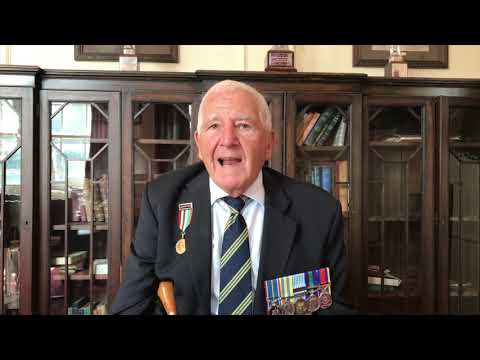
>> With his bottle of whiskey, and he cut the circulation back, and the two doctors come back and examine me and say, "Well, Yuri has done has trick again," and he saved my foot. Anyway, a couple days later, before I got discharged, I said, "I'd like to thank Yuri for saving my leg," and he said, "Well, you won't be able to see Yuri for a couple of days." I said, "Why?" He said, "Well, you don't think he threw the whiskey away, do you?" [INAUDIBLE]. That's really speaking of my recollections of Korea really because it was such a long time ago. But I'd done 18 months in Korea, and then I'd done 18 months then in Malaya, so I went from one very, very cold country to a very, very hot country. All in all, I'd done 5 years in the Army and came out and got back [INAUDIBLE] and got money to raise a family. I'm a great-grandfather now. I've got six great-grandchildren.
>> One more, one more.
>> One more, yeah, seven, and really speaking, I feel like I didn't do anything heroic. I wasn't a hero. I was just an ordinary soldier doing what I was trained to do.
>> Why did you join?
>> I had to. National service, you had to go in. I was 18.
>> It must have been ... But you went after the war started.
>> No, yes, yes, yes.
>> So that must have been terrifying because it's one thing to be conscripted before the war because you don't think it's going to ... They didn't think it was going to be a full-on war, but for you to hear of boys being killed and for you to have to go, that must have been terrifying.
>> Actually, it wasn't really because at 18, it was an adventure. We never thought about getting killed, never thought. The biggest shock I had, we went to Japan first, and then from Japan, we went to Pusan, and we went by train and up to Seoul, and when we got off the train at Seoul at Seoul Railway Station, it went flat. Everything was bombed, and Cardiff was very heavily bombed during the Second World War. When I was growing up, I was 10 or 12 during the Second World War. And all my friends were with me. They were the same age as me, and they'd all seen plenty of bomb damage, but none of us have ever seen much damage around Seoul Railway Station as we've seen in this country. We even went to Hiroshima when we were in Japan, and even that didn't look as bad as Seoul Railway Station because Hiroshima is flat. There's no buildings in it at all, but to see all these bombed buildings and a railway station in pieces, and all of a sudden, we realized that it wasn't about a schoolboy adventure. This was serious, and it really ... I wouldn't say it frightened us, but it really shocked us. We thought, "This is not a schoolboy adventure. This is something serious," and I was only just 18 1/2, and my other friends were all about the same ago. None of us were 19, and it really shook us. It kind of sobered us up. I think from that moment we went from being boys to being men because it was such a shock to our system.
>> Can you say your name one more time?
>> My name is Kohn, Nicholas Kohn.
>> And your birthday?
>> Fifth of August, 1934.
>> You're a Leo.
>> So I've just gone 84 a couple of weeks ago.
>> And you were born in ...
>> In Cardiff.
>> In Cardiff. I like Cardiff a lot.
>> Cardiff is not a city. Cardiff is a big village because everybody seems to know everybody. It's a very friendly town, very, very friendly.
>> Did you know any of the 32 that died?
>> No, no, no, no.
>> Did they ...
>> They were there a year before me. They were there in '52, and I didn't get there until January '53, so I only had the last 7 months of the Korean War.
>> The big ones where they suffered most casualties were in ...
>> '51 and '52.
>> Yeah.
>> Yeah.
>> Well, God spared you twice.
>> It was very static when I got there. It was something like the First World War. We were one side of the fence, and the Chinese were the other side of the fence, and that was it. There wasn't too much to-ing-and-fro-ing, not like in the early part of the war.
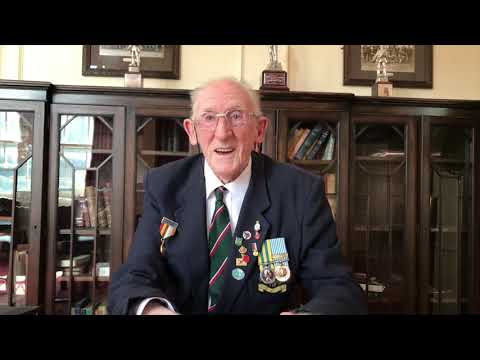
>> I was born in Cardiff, and I served in the army from 1951 to '53 and also 3 years in territorial.
>> When were you born?
>> Cardiff.
>> When's your birthday?
>> 28th, the 10th, 1930. I'm 88.
>> 1930, and you said you joined the army 19 ...
>> 1950.
>> And you were, of course, conscripted.
>> Yeah.
>> Yes, and when in ... So did you fight in the battle of Gloucester?
>> I was wireless operator and a signaler, so I could show you the proof of that.
>> Yes, please. Show us. You collected these? You collected these?
>> Yeah.
>> What's that picture?
>> That is the wireless I used to operate.
>> You took a picture of it?
>> Wow.
>> Did they train you to operate that?
>> It's was a 62 set, and then there was a 31 set and a 88 set. The 88 set was small one worn in the pouch. The 31 was worn on the back, and that was carried on the back, so ...
>> Wow.
>> From there on is all the members of the United Kingdom that were killed.
>> I'll put it here.
>> Okay.
>> Wow.
>> That was a memorial service.
>> Wow. In ... At the United Nations' military?
>> I can't believe you kept all of this. Where is this?
>> The operator in Devonshire.
>> Is in north of Wales? Where in Wales is it?
>> Oh, no. It's not in Wales. It's in ...
>> Is it in England?
>> ... Derby.
>> This is the memorial that's in St. Paul's plus the queen [INAUDIBLE].
>> Did you know anyone that was killed personally? Did you personally know anybody?
>> That's the standard of the Cardiff branch, and we carried that for 30 years from 1985 until recently, and it's on the wall in St. John's church now where it will stay until it falls to pieces.
>> So ...
>> I'm glad you went to the Llandaff Cathedral to see the book. It's turned every day with the names of the ...
>> The branch no longer exists.
>> No.
>> Because there was nobody left.
>> When did it disband?
>> Two years ago, no? It was finished. That's my wife.
>> She's gorgeous. Can you ... What's her name?
>> Gloria.
>> Can you please thank her for me?
>> Gloria Elizabeth.
>> She's beautiful.
>> Yeah, yeah.
>> When was this? Oh, 1987.
>> Yes, I think it was.
>> Where did you say this is?
>> In St. Paul's Cathedral in London.
>> And you went there?
>> Yes.
>> Oh. Do you have any specific memories? You can explain them. You can explain the pictures.
>> Yeah, yeah. That's ... You remained in barracks. [INAUDIBLE] we weren't allowed out, so the dance ... So the girls we were with came into the dance, and that's where I met the wife.
>> Oh, you met her during ...
>> 1952. Wow. During the war.
>> Yeah, during the war.
>> When did you get married.
>> After the war.
>> After the war, yeah.
>> What was she doing?
>> My wife?
>> She worked in a factor making cigars.
>> But you met her where?
>> In the barracks here.
>> Maindy Barracks?
>> Yeah.
>> But what was she doing at the barracks?
>> She came to the dance with her friends because they arranged a dance.
>> Oh, and then so they heard about it, and they came.
>> Yeah.
>> Wow. Where did you get married? You could have got married here?
>> Oh, we got married in St. Paul's in ...
>> London?
>> ... Grayshott. No, in Grayshott.
>> Gloria, you said, right? Wow, you kept everything so well. Everybody talks about the Christmas card.
>> Yeah, oh, yeah, but there's the Christmas card that [INAUDIBLE] sent us. You can take it out.
>> And what does it say? Read it.
>> It's telling us to go home and to have peace. Don't fight no more, and what you looked at just now is the safe conduct passes.
>> What is ...
>> That is the ...
>> Thirty-two.
>> That's the 32 boys that were killed.
>> Did you know any of them?
>> Oh, yes, quite a few.
>> Really?
>> Yeah.
>> How did you know them? How did you know with them?
>> I served with them.
>> You served with them.
>> Being a wireless operator, you sort of go a lot of ... There we are. That boy there, he was the last one on that list.
>> Williams.
>> Yeah.
>> Same last name as you.
>> And the bunker came in on him. He was buried alive, so when they dug him out, he was dead. The bunk collapsed, and that's the three of us. We were all wireless operators, and that at the back is the bunker we were in.
>> What was his name? It says J. S. Williams.
>> Yeah, John.
>> John Williams. No relations?
>> No, no, no.
>> Bunker collapsed and buried alive. How old was he?
>> There, he's 17. No, what am I on about? He'd be 19. I think he was 19.
>> That must have been very traumatizing for you, the war, if you saw friends die.
>> That is myself, and that's the boy from the Falklands War.
>> Oh, okay.
>> You hear of the Falklands War?
>> Mm-hmm.
>> Yeah. That's the Cardiff Castle.
>> The war must have been very traumatizing for you.
>> It was.
>> How are you able to cope with it?
>> You can't ... You more or less got to put up with it. There's nothing much that you can do. You're there, and they're throwing stuff at you, shells and mortars and Hill 355.
>> But you called ...
>> But a lot of the boys were killed for your government.
>> Yes, yes.
>> One, six, nine.
>> Do you feel like the Welsh no about their sacrifices?
>> Oh, yeah, yeah.
>> The Welsh, you think the general public knows about the Korean War?
>> Oh, they do know.
>> Oh, I'm glad to hear that, so it's not forgotten here.
>> Yeah, yeah.
>> That's very good. I'm happy to hear that, very happy to hear that. Do you have any story of your own that you remember?
>> Well ...
>> Any story, specific story that you'd like to share.
>> That will give you the history of the boys [INAUDIBLE].
>> Mm-hmm, I took a picture of that.
>> That's a photocopy, so you can have that.
>> Oh, thank you.
>> And ...
>> This is wonderful actually.
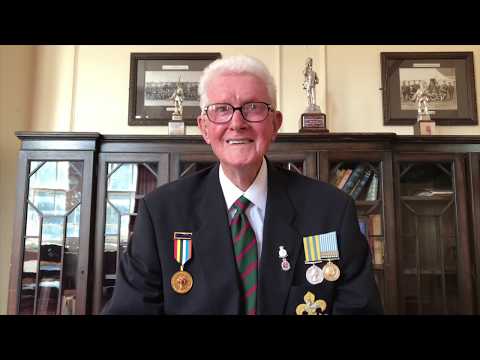
>> My name is William Longden Kurris. I was born on the 11th of March, 1932. I went to Korea in 1952 in about September time, and I was there then until September and October in 1953, so I was out there when the war was on, and I was out there when the armistice was signed, and the war never finished.
>> Do you remember leading up to the armistice?
>> Yes, I remember everything while I was out there. I think so.
>> Tell us, and what were you assigned to do?
>> To give the country freedom.
>> Oh, you didn't fight? You were feeding people?
>> Pardon?
>> What was your position in the army?
>> My position was a private.
>> Mmm.
>> But before we went in the army, I went in an army ... I went in the army when I was 20 years of age. It should've been 18, but I was in college. I was a student studying in Cardiff here, so I didn't go into the army until another 2 years, so that's why I went to Korea then, when I was 20 instead of 18.
>> And what did you do in the army?
>> I was a private, and I was in the front line, on ...
>> So you were ...
>> I was on ...
>> You saw combat?
>> I was ... Yes, I was on guard this one particular night, and it was a cold night. It was Christmastime, and a friend of mine, just before the morning came, he went down the front path of our hill, and there was Christmas cards on the trees, and I got one here. He came back, and he gave it to me. I was on guard, and he gave it to me, and that's from the North Koreans, and it says, "Merry Christmas," and it's even got the signature of the person that put it there. And it's from the Bank of Korea.
>> Wow, this is different.
>> I don't think there's many of them about.
>> No, I have the ones that are not personalized like this, with a name.
>> No, it's even signed by them as well, Bank of England ... Bank of Korea.
>> Oh, my god, he's saying, "Don't fight in the war."
>> Yeah.
>> Oh, my gosh. Did you know any from the regiment personally that died?
>> Yes, I did. I was with a personnel that was attached to my regiment for the [INAUDIBLE] and he was with me for quite a few months, and I got very friendly with him, and his name was Keith Stanley Osborne, and I was in the same position with him, and we slept almost together in our separate sleeping bags, and he said, "William." He said, "I'm going on patrol tonight." I said, "What for?" He said, "I volunteered to go on the patrol." I said, "What do you want to do that for, Keith?" and he said, "It will be experience." Anyway, he used to show me photographs of himself achieving a cap and gown from university and college and also a photograph of his fiance that also had a cap and gown, and he said that we were going to get married once he come out of the army after 2 years, and I got quite attached to him, and I thought he was a nice chap, a nice friend, and he volunteered to go on this patrol, and I got up in the morning, and I thought, "I wonder where Keith is. He's a long time coming back," so I went down, further down the mountain, to the CO's position, and the CO said, "William." He said, "I'm sorry, but he's been blown to pieces. There was enemy fire when he was on patrol. They all scattered. The patrol scattered, and he stepped on a mine, and he was blown to pieces," and that stuck in my mind, and I had a jaunt to get over that, and to this day, I still keep on remembering that. He was ever such a lovely person, and he was only doing his 2 years, and he wanted to get out, and he was going to get married to his fiance, but then he was at the end of the story, right?
>> What was his full name?
>> His name was Keith Stanley Osborne, and he was one of the 24 people that was killed for in our 1st Battalion of the King's Regiment, and four was missing. I don't know if any those was survived, the ones was missing.
>> So you were part of the King's Regiment, not the Welch Regiment?
>> Yes, I was the King's ... in the King's Regiment, but I went out to Korea with the 1st Battalion, with the Welch Regiment, but the Welch Regiment was in Korea then, but they only had 7 months to go, and they would be coming out, so what they did, they transferred all of us when the Welsh went out, and they transferred us to the 1st Battalion of the King's Regiment.
>> But why is his name not among the 32?
>> Pardon?
>> Keith, Grandpa, Keith, his name is not among the 32 because he was British. He was English.
>> He was English, yes. He was English.
>> Hmm, he wasn't Welsh.
>> Because he was born in Oldham. He was born in Oldham, and he was the only child, and he spoke about his mother, but I can't remember if he said anything about his father, but when I came out of Korea, I would have liked to have gone to see her and told her that I was a friend of her son's. But anyway, I ...
>> You wanted to go see her?
>> Yes, and ... But I never did that.
>> Explain this picture.
>> That's the cook. I was in the reserve position ...
>> Hmm.
>> ... when we went in reserve position.
>> He's a cook?
>> Yes, I was ...
>> The little boy?
>> No, he wasn't the cook. The cook was ...
>> Oh, how about the little boy?
>> And in the background there, there's big drums that held the kerosene that kept the all the transport going, the petrol, also the diesel, and after they were done, they made them the cooking ovens.
>> How about the little boy?
>> Yes, that boy was South Korean.
>> He was a house boy?
>> I can't remember his name, but he was a good kid, and he was always there to help.
>> He was a house boy?
>> Yeah.
>> There were a lot of the house boys, huh?
>> Pardon?
>> There were many house boys.
>> Yes, that's right.
>> Well ...
>> Yes, that's all the ships I ... troop ships that I went on to Hong Kong. I did Korean training in Hong Kong. Yeah, that's it. That's me sending them, my mother and father and my two brothers, and my two brothers, they have passed away since.
>> Oh ...
>> And they was younger than me. They both died of cancer.
>> Sorry to say anything.
>> And I've had cancer twice, and I'm under the cancer [INAUDIBLE] right now, but [INAUDIBLE] have saved ... give me more than 20 years life.
>> Well, I am glad to hear that.
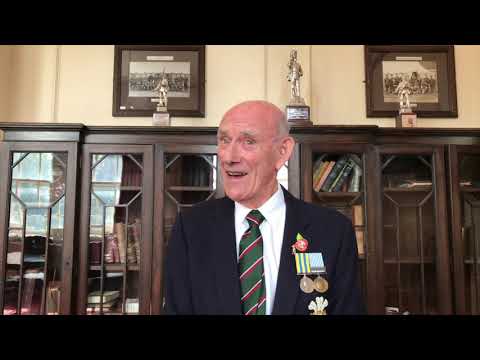
>> My full name is Emerest Moore. I'm 89 years of age, which means I was born on the 4th of August, 1930. I was called up to do national service at the age of 21 because until then, I was deferred to get qualifications in my particular trade. Prior to that, national service was 18 months, but because of the Korean War, it was increased to 2 years. I trained for 3 months with the Welsh Regiment in Brecon in South Wales, and then we sailed to Korea on the Empire Windrush. I eventually landed in Hong Kong to do some training after 4 weeks on the troopship, and then we were shipped off to Japan to [INAUDIBLE] where I did further training in the [INAUDIBLE] battle school up in the hills above [INAUDIBLE]. And then I was fortunate to remain with the Welsh Regiment, and I was transferred across to Korea to serve with the First Battalion, the Welsh Regiment in July. I didn't spend a 12-month there because I was late being called up, I suppose, a national serviceman. So I served from July and came out with our battalion in October. Unfortunately, I didn't experience the Korean winter, which was very, very bad, but I knew all about the heat and the dust and the dirt and the monsoons, I suppose, and living in the bunkers, which wasn't a very nice place. The one thing that I can recall, I must say I was always a believer in fate and luck. I was lucky to join the battalion in July when a lot of the boys who went out there on my particular drat were transferred into the Black Watch Scottish Regiment, and they served the full 12 months in Korea. Some of the boys then who came out later with a Welsh badge, they were transferred into the King's Regiment, and they served for 12 months, so Lady Luck was on my shoulder, and I didn't do the full 12 months there. During the time I was there, there was no major offensive with the Chinese. It was mainly patrol work into no-man's-land, reconnaissance patrols, ambush patrols and so on, and one thing that really stands out in my mind was that on the 1st ... I'll never forget it, the day, 1st of July, correction, 1st of August, I was detailed to go on an ambush patrol in no-man's-land. We were out there for 4 hours in total, and it was uneventful, no contact with the enemy, and we came back in safely, but I learned 3 days later that the similar patrol from B company, I think it was, went out, and they were attacked, and they lost three dead and seven wounded, and again, I'm grateful that Lady Luck was on my shoulder because it was so uneventful. And then every patrol I went on after that, there was no contact made, so I'm one of the fortunate few who came out from Korea, and I'm standing here today. So whether that is of interest to you, I don't know.
>> I don't believe in luck. I believe in God's faith, and He spared ...
>> Fate and luck, I've always thought of in that way.
>> He spared you.
>> So I thought I'd keep it brief and just mention that one thing that really stands out. I could have been on that patrol on ... I think it was the 2nd of August, same patrol. The other things are small. We were shelled. We were shelled so often, we had to run for cover if your boys got killed, and on that particular patrol that was hit the night after we were out, one of the lads who trained with me in Brecon, John Hawkins, he was killed, good friend, and we were in training together. And of course, a couple of the other lads who were transferred into the Black Watch Regiment, they were killed out there as well. So the Welsh Regiment, in all, we lost 32 men. It was nearby.
>> Did you know any of them?
>> Oh, yes, I knew one particular from North Wales, Idris Evans. He was in the Black Watch. He was in the Welsh originally, but he was transferred in to the Black Watch and went up to Korea with them and served a 12-month there, but no, he didn't serve the 12-month there because he was killed.
>> How was he killed?
>> Apparently, from what I was told by one of his friends, the Chinese were shelling the positions, and they ran for cover to their bunkers, and a shell landed in the trench, exploded, and the shrapnel obviously flew into the bunker and killed him. Yeah, he was from North Wales, and John Hawkins, the one who was in the Welsh, was killed on patrol. I think he was shot, from what I gather.
>> I'm glad God saved your life.
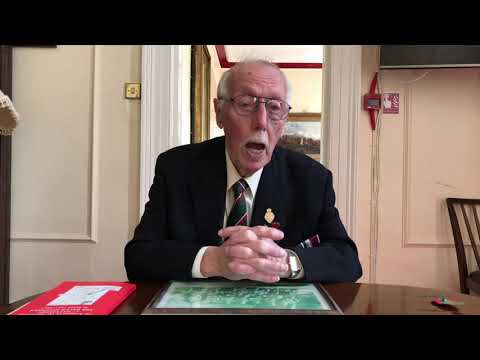
>> My present title is Major Tudor Price, MBE. In the Korean War, I was a sergeant in the First Battalion, the Welsh regiment. I joined the battalion in January, 1952 on a feature called the Shimyeondong Valley, and the feature in front was known as Hill 169. My date of birth was the 4th of the 2nd, 1929. Having been on a 12-hour patrol, up to my eyes in snow, I came back with the patrol, and this young officer put a tumbler of rum in my hand, and he said to me, "The King is dead. Long live the Queen." That was 2 days after my 23rd birthday, the 6th of February, 1952. Her Majesty, the Queen, came to the throne. I served in Korea right up until we left, which was in November 1952. By that time, the Korean War had become, as we were all concerned became static lines just like it was in the 1914, '15. The attacking forward up to the Yellow River led by General MacArthur had stopped and seized, and took over from the First Battalion. We lost a regiment, which was really wiped out. Now one of the things they handed over to us, like we took Korea, we took our regiment [INAUDIBLE]. They handed over to us a rabbit called Harvey. Do you remember the film, "Harvey," and the drunkard, played by Henry Fonda, I believe, or somebody or James Stewart. I can't remember. Anyway, we carried on patrolling the no-man's-land in between the North and the South, and this would continue for a number of months, and at one time, our B company did an attack on a hill called Hill 270, and this was fought on this hill feature called 355. Unfortunately, a lot of our boys were wounded and one or two killed. In fact, if you look at our title of our book of the Welsh Regiment, it lists 32. We lost 32 men killed in Korea and quite a number wounded. Now this book was compiled by the intelligence officer we had in Korea, a Lieutenant Norman Summon, who finally retired as Major Norman Summon, and he and the curator for the museum compiled the history of the Welsh Regiment in Korea in the Korean War. I should say, when I did arrive in Korea, I arrived after the battalion, and I landed at Busan in the south. Busan, in those days was a shanty-type of a city, [INAUDIBLE] city which had been devastated by war, and we were greeted by an American band that played us on ashore, and we then entrained right up to Seoul, and I think ... I can't quite remember. It was either Uijeongbu or Kumjongti, something like that, that we disembarked, and in fact at the end of the Korean War ... end of our joint in Korea, we handed over to the Duke of Wellington's Regiment, and again, we entrained at the same place in one of those two railway stations, and we embarked for Busan, where we got on the troop ship. Before we embarked the regiment went to the Commonwealth War Graves Cemetery, which is situated in Busan, and we held a service there to commemorate all those boys that we lost and were wounded or suffered whilst in the Korea. Whilst I was up in the line at one time, I was sent back to Seoul to carry out a ceremonial duty on a general that visited. His house man, the man that run his estate in Seoul, took us on tours of Korea ... Of Seoul, I should say, and we could see the devastation that was caused by when the North came down and, as you know, attacked the South, but in conclusion, I must say that the people of Korea have pulled themselves out of nothing and one of the leading people in this world today. Where we be? We'd be without out televisions and radios and so on. I thank the people of Korea, and I always enjoy the people, and in fact, I got this photo of platoon in Korea. That's a photo of my platoon, and on there are the house boys that looked after me or looked after us, I should say. They were apart of the Korean Service Corp. They came up first thing in the morning to make sure we were all right, help us with our chores, getting washed, getting dressed. We even shaved in the front line. If we didn't have water. We melted the snow, but those boys were very useful, and as I said earlier, we used to have a ration of 50 cigarettes in those days which I give to the house boy to thank him because not only did he keep an eye on me, he took my dirty washing down the hill to bring back a few days later. Now that is him. When we were out on the line, this is the picture that was taken of the sergeant's best that was in Korea. I'm on there as a very young 23-year-old, but will no conclude and say I was very, very proud for having served in Korea, and it noticed, other my first medal, my first two ribbons are the British Korean and the United Nations medal. I would now like to conclude this interview. Thank you very, very much indeed.
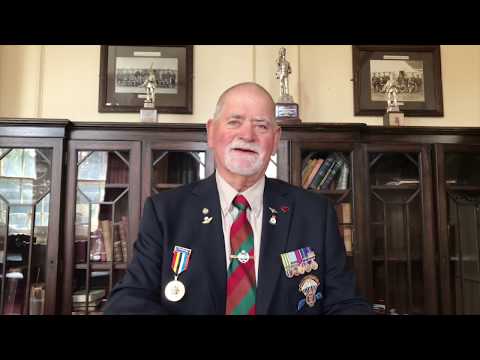
>> Your full name.
>> My name?
>> Thomas Perkins.
>> Thomas Perkins and your date of birth and where you were born?
>> I didn't hear that.
>> Your date of birth and where you were born?
>> Oh, I was born in Pembrokeshire, Wales in a place called St Davids, the smallest city in Europe.
>> Okay. When did you serve in Korea?
>> When did I serve in Korea? 1951 to '53.
>> Can you share what you brought with us? You brought something.
>> I've got something?
>> Mm-hmm.
>> Yeah, just a photograph of me in Korea. I was 19 years of age.
>> What do you remember about your buddies? What do you remember there?
>> I was in the Tank Corps. I was a tank driver.
>> Oh.
>> Yeah, and this is ... That is actually the tank that I drove when I was Korea.
>> Oh.
>> That one there.
>> Can you show it like this?
>> Sorry?
>> Can you show the picture like this? Yes. Wow. It's the real one?
>> Oh, yes.
>> Did you know any of the 32 that died in the war?
>> Did I?
>> Mm-hmm.
>> Did I know any?
>> Who died, yes.
>> Who died?
>> Yes.
>> I ... We only a couple of men in Korea.
>> Thirty-two.
>> That one ...
>> Were you part of the Welsh Regiment or the King's Regiment.
>> No, no, I was Tank Regiment.
>> Was the tank part of the King's or Welsh?
>> I was a Tank Regiment.
>> It's a separate?
>> Not in Korea, no. Welsh Regiment Infantry.
>> May I take a picture of that one too?
>> Yeah, that's ... This is the crew of that tank.
>> Oh.
>> That is me. I was the tank driver with [INAUDIBLE] gunner, and that's a radio operator.
>> What was ... What's your one story?
>> That was during the actual war. We were on the battle of the Hook. Also ...
>> What's the battle of the Hook.
>> It's an area within the Commonwealth division in Korea.
>> Mm-hmm.
>> And we had a place called the Hook, which is the hook, and then we had other positions, which are relevant to the area, 355, 159, 210, 10, and they all had names, [INAUDIBLE], Little Gibraltar.
>> Wow. Do you remember ... Have you been back to Korea?
>> No, I have no wish to go back?
>> Why not?
>> When I went there, it was a lovely ... When I went there it was a nice, quiet country. There was no skyscrapers. It was very, very basic.
>> Mm-hmm.
>> The people were very basic.
>> Mm-hmm.
>> And there was this war going on, which wasn't very nice, and it was very cold.
>> Very cold.
>> Everybody talks about how cold it was.
>> You could have a cup of tea and put it down, and 5 minutes it was frozen.
>> I'm glad you made it back very safely.
>> No, I've not been back. I've not ... I've no wish to go back there.
>> Oh, no, I mean back home.
>> Sorry?
>> Back home.
>> Back home?
>> Yeah.
>> When did I get back home?
>> I went to Korea '51. I didn't come back home to this country because I went to other places.
>> You were in the military.
>> I was in a long time. I went from Korea to Malaya. That's in Malaya.
>> Yeah, from very cold to warm.
>> That's Malaya, further down, and I served in Malaya. These are letters I had from your ...
